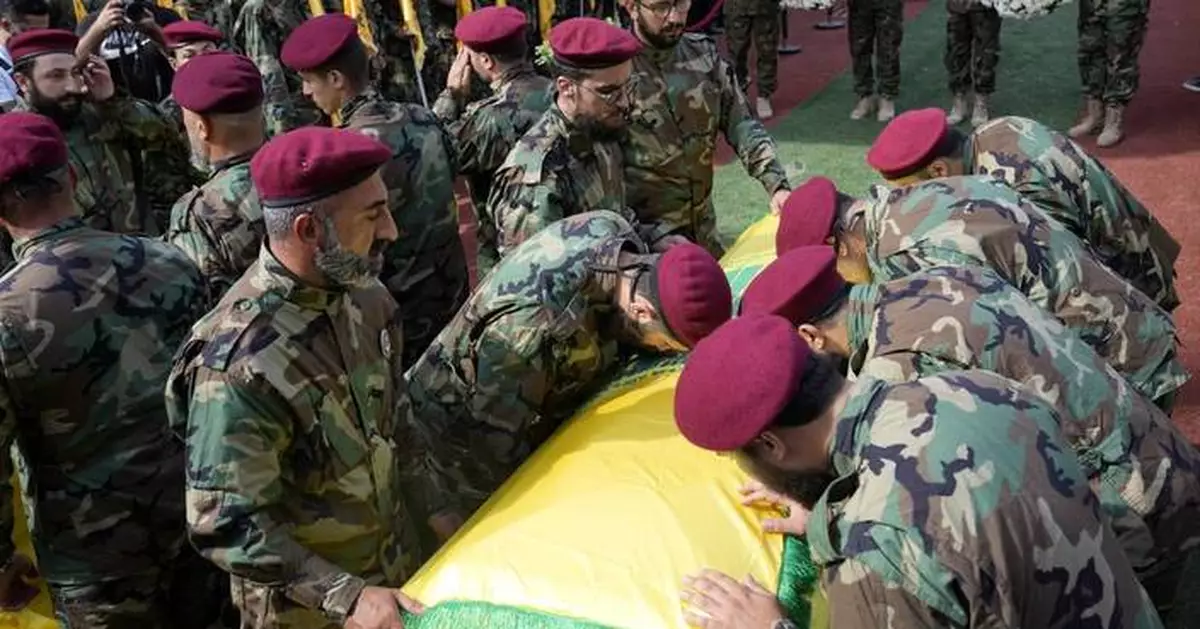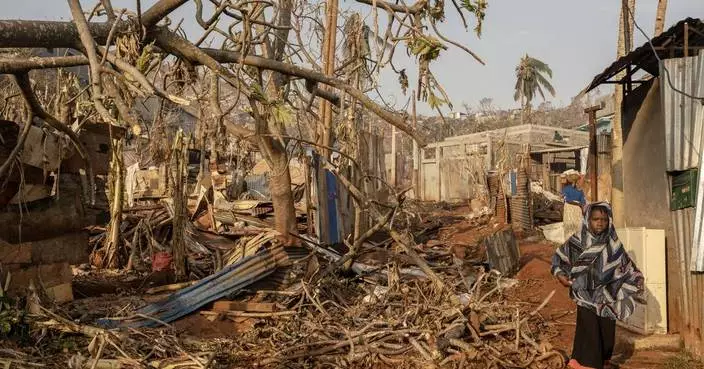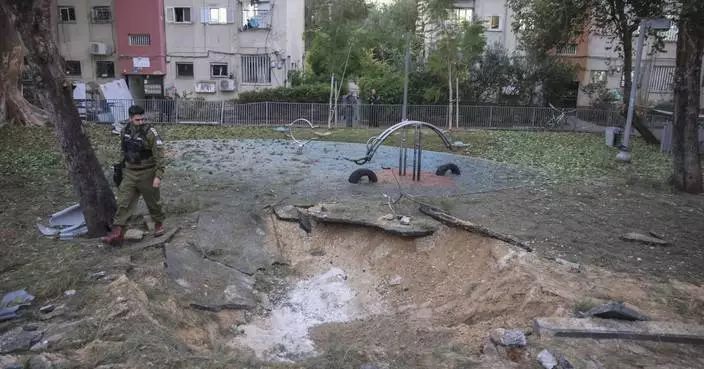BEIRUT (AP) — The waves of remotely triggered explosions that hit pagers and walkie-talkies carried by Hezbollah members in grocery stores, on streets and at a funeral procession this week made for an eerie and shocking spectacle.
Analysts said Hezbollah will be able to regroup militarily and find communications workarounds after the attack, but the psychological effects will likely run deep.
Click to Gallery
Israelis take cover next to a shelter as a siren sounds a warning of incoming rockets fired from Lebanon, in Nahariya, northern Israel, Thursday, Sept. 19, 2024. (AP Photo/Baz Ratner)
Hezbollah members attend the funeral of two of their comrades who were killed on Wednesday when a handheld device exploded, during a funeral procession in the southern suburbs of Beirut, Thursday, Sept. 19, 2024. (AP Photo/Hussein Malla)
Hezbollah members carry the coffins of two of their comrades who were killed on Wednesday when a handheld device exploded, during a funeral procession in the southern suburbs of Beirut, Thursday, Sept. 19, 2024. (AP Photo/Hussein Malla)
Hezbollah members carry the coffins of two of their comrades who were killed on Wednesday when a handheld device exploded, during a funeral procession in the southern suburbs of Beirut, Thursday, Sept. 19, 2024. (AP Photo/Hussein Malla)
People watch the speech of Hezbollah leader Hassan Nasrallah on a tv screen as they sit in a cafe in the southern suburbs of Beirut, Thursday, Sept. 19, 2024. (AP Photo/Hassan Ammar)
Women sit in a cemetery as they visit the graves of killed Hezbollah members in the southern suburbs of Beirut, Thursday, Sept. 19, 2024. (AP Photo/Hussein Malla)
Hezbollah members mourn over the coffins of two of their comrades who were killed on Wednesday when a handheld device exploded, during a funeral procession in the southern suburbs of Beirut, Thursday, Sept. 19, 2024. (AP Photo/Hussein Malla)
The explosions — widely blamed on Israel, which has neither confirmed nor denied involvement — killed at least 37 people, including two children, wounded more than 3,000 and deeply unsettled even Lebanese who have no Hezbollah affiliation.
The detonating devices hit workers in Hezbollah’s civilian institutions, including its health care and media operations, as well as fighters, dealing a blow to the militant group's operations beyond the battlefield. It is not clear how many civilians with no link to Hezbollah were injured.
The attacks also exposed the weaknesses in the low-tech communications system the group had turned to in an attempt to avoid Israeli surveillance of cellphones.
Retired Lebanese army Gen. Elias Hanna described the attacks as the “Pearl Harbor or 9/11 of Hezbollah.”
Mohanad Hage Ali, a senior fellow at the Carnegie Middle East Center think tank who researches Hezbollah, said that because the blasts hit people across the group’s institutions, the attack was “like a sword in the guts of the organization.” Hundreds of people were severely wounded, including many who lost eyes or hands.
“It will require time to heal and replace those who were targeted,” he said.
But Hage Ali and other analysts agreed that the loss of manpower is not a crippling blow. Hezbollah leader Hassan Nasrallah has said the group’s fighting force numbers more than 100,000, meaning that the attack — as dramatic as it was — would have put only a small percentage of its militants out of commission even if all those wounded and killed were fighters.
Qassim Qassir, a Lebanese analyst close to Hezbollah, said the detonating devices actually struck mostly civilian workers within the group and not military or security officials, which has allowed it to contain the impacts on its war effort.
Hezbollah, which is Lebanon’s strongest armed force, has exchanged fire with Israel’s military almost daily since Oct. 8, the day after a deadly Hamas-led assault in southern Israel triggered a massive Israeli counteroffensive and the ongoing war in Gaza.
Since then, hundreds have been killed in strikes in Lebanon and dozens in Israel, while tens of thousands on each side of the border have been displaced. Hezbollah said its strikes are in support of its ally, Hamas, and that it will halt its attacks if a cease-fire is implemented in Gaza.
Speaking Thursday, Nasrallah acknowledged that the pager and walkie-talkie attacks represented a “severe blow,” but he vowed that the group would emerge stronger than before.
Hezbollah continued to launch rockets over the border Wednesday and Thursday after the pager and walkie-talkie attacks, including one that killed two Israeli soldiers.
The impacts on Hezbollah’s communications network are likely to be more disruptive than the human loss.
“Telecommunications is the nerve of military operations and communications,” said retired Lebanese army Gen. Naji Malaeb, an expert on security affairs. A delay in communication could spell disaster, he said.
In February, Nasrallah warned members not to carry cellphones, which he said could be used to track them and monitor their communications.
But long before that, Hezbollah relied on pagers and its own private fiber-optic landline network to avoid the monitoring of its communications.
The pagers that detonated Tuesday were a new model the group recently began using. It appears that small quantities of explosives had been implanted in the devices at some stage in the manufacturing or shipping process and then remotely detonated.
Hanna said the group might rely more heavily on its landline network — which Israel has attempted to tap into on multiple occasions — going forward, or on even lower-tech solutions such as hand-delivered letters.
“Maybe you have to go back to human communication, the postman,” he said. “This is what is really helping (Hamas leader) Yahya Sinwar not to be targeted” in his hiding spot in Gaza.
Orna Mizrahi, a senior researcher at the Tel Aviv-based think tank Institute for National Security Studies and former intelligence analyst for the Israeli military and prime minister’s office, said losing the ability to communicate through pagers is a “dramatic blow,” but the militant group has other communication methods and will rebuild their communication network.
The bigger damage to Hezbollah was psychological, she said.
“It’s the humiliation of having such an operation, it shows how much the organization is exposed to the Israeli intelligence,” she said.
Amal Saad, a lecturer in politics and international relations at Cardiff University in Wales who researches Hezbollah, said much of the attack's impact was the “demoralization and the fear” it sowed.
“It’s not just a security breach against the military," she said. "Hezbollah’s entire society is going to be extremely concerned because everything is liable now to being hacked and rigged.”
The group will “be rethinking many things now, not just the pagers," Saad said.
Associated Press reporter Melanie Lidman in Jerusalem contributed to this report.
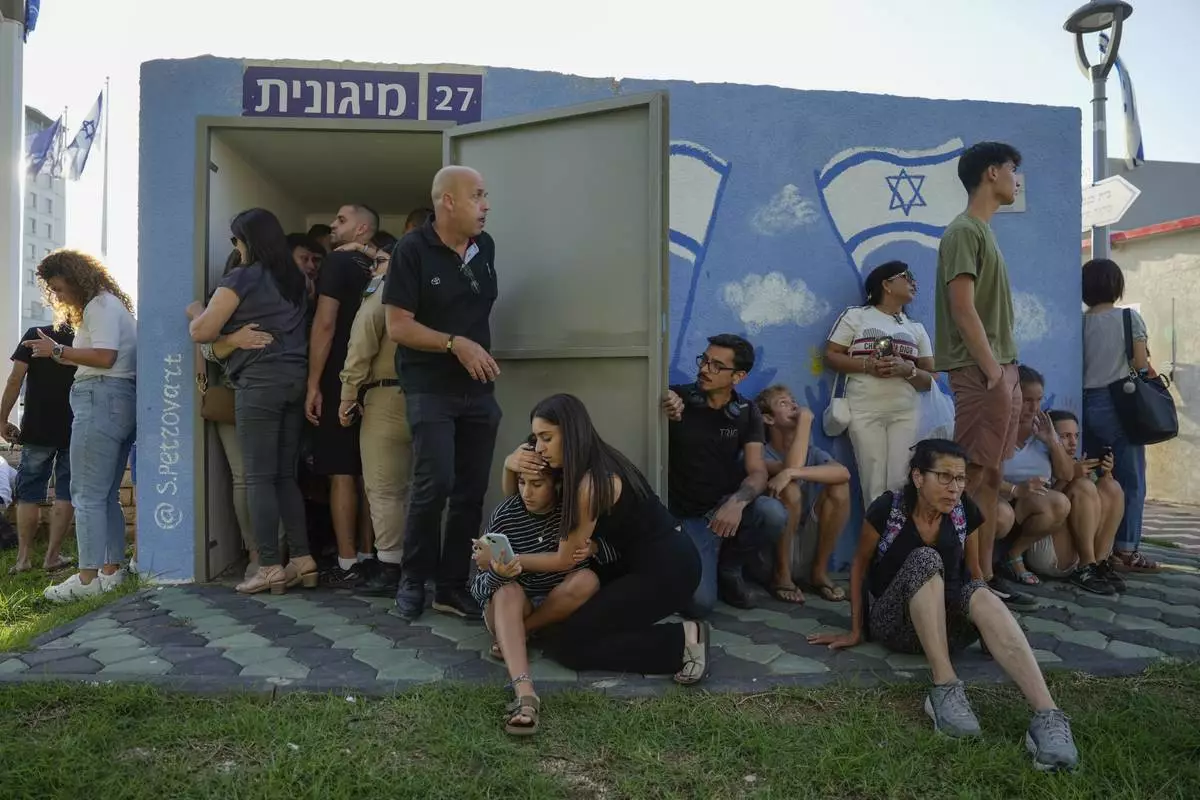
Israelis take cover next to a shelter as a siren sounds a warning of incoming rockets fired from Lebanon, in Nahariya, northern Israel, Thursday, Sept. 19, 2024. (AP Photo/Baz Ratner)

Hezbollah members attend the funeral of two of their comrades who were killed on Wednesday when a handheld device exploded, during a funeral procession in the southern suburbs of Beirut, Thursday, Sept. 19, 2024. (AP Photo/Hussein Malla)

Hezbollah members carry the coffins of two of their comrades who were killed on Wednesday when a handheld device exploded, during a funeral procession in the southern suburbs of Beirut, Thursday, Sept. 19, 2024. (AP Photo/Hussein Malla)
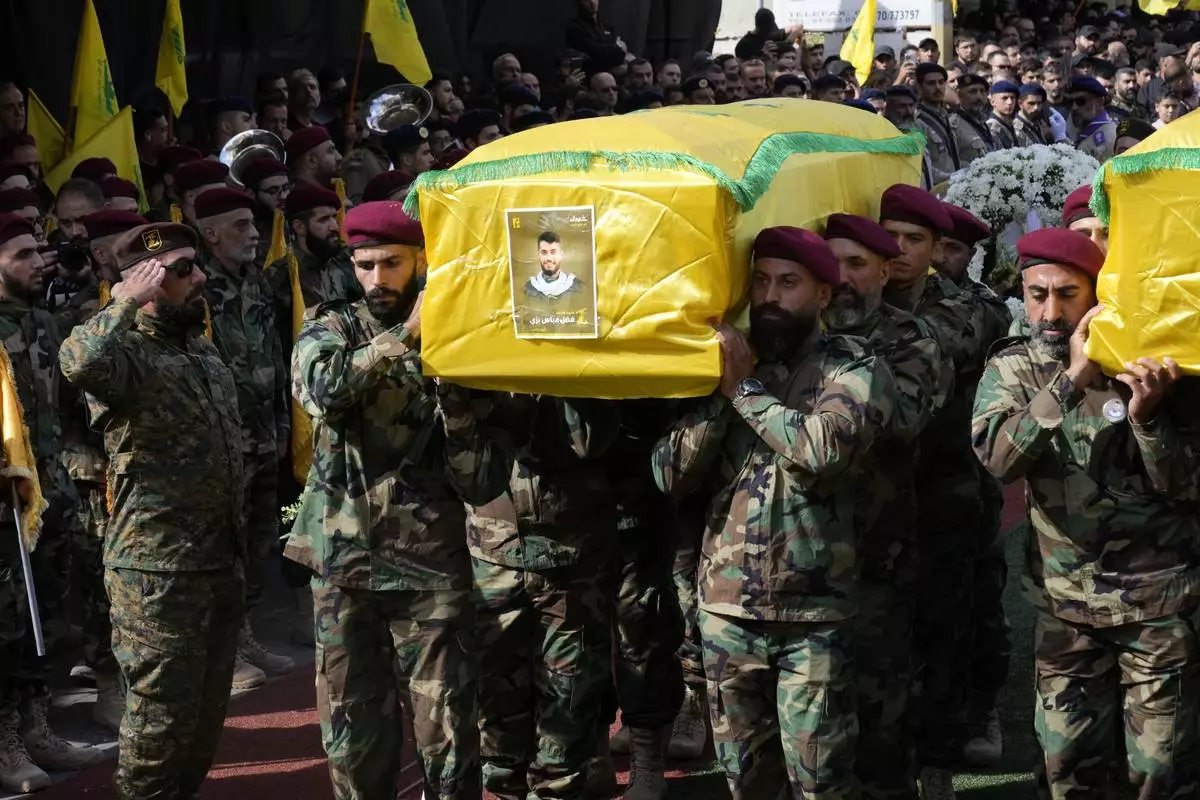
Hezbollah members carry the coffins of two of their comrades who were killed on Wednesday when a handheld device exploded, during a funeral procession in the southern suburbs of Beirut, Thursday, Sept. 19, 2024. (AP Photo/Hussein Malla)
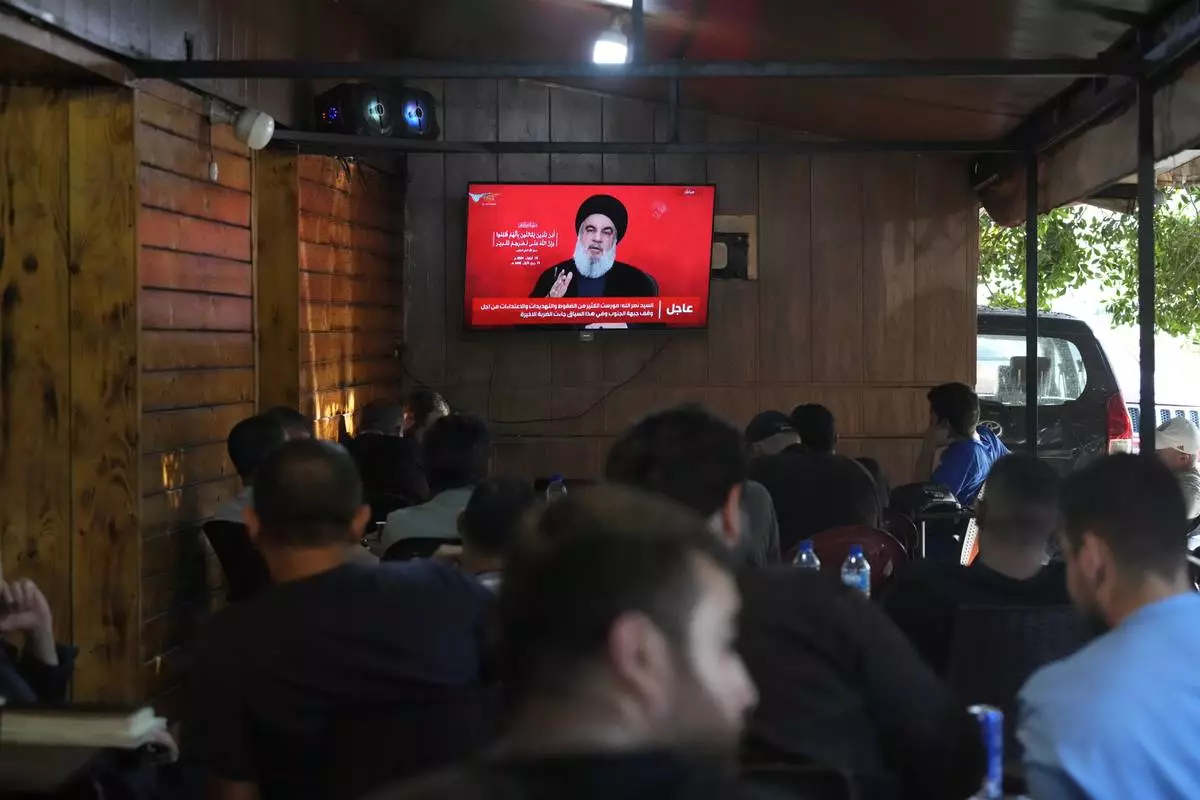
People watch the speech of Hezbollah leader Hassan Nasrallah on a tv screen as they sit in a cafe in the southern suburbs of Beirut, Thursday, Sept. 19, 2024. (AP Photo/Hassan Ammar)
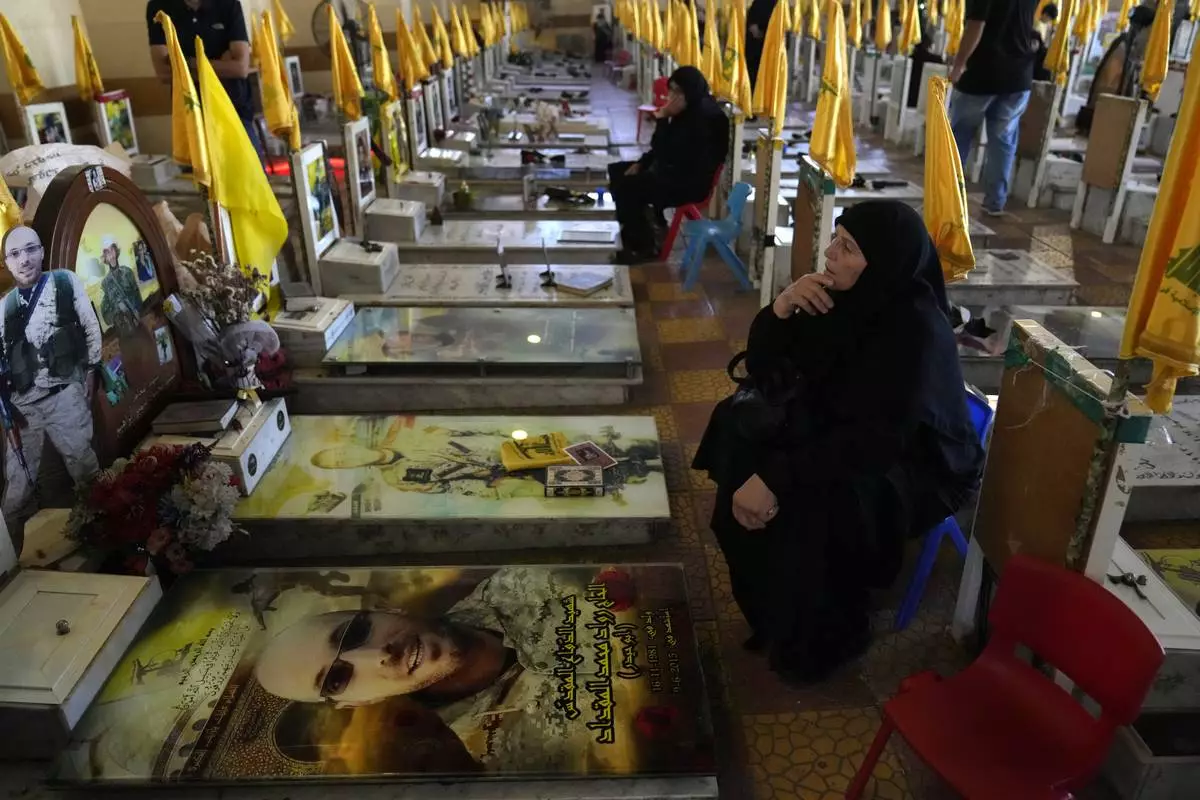
Women sit in a cemetery as they visit the graves of killed Hezbollah members in the southern suburbs of Beirut, Thursday, Sept. 19, 2024. (AP Photo/Hussein Malla)
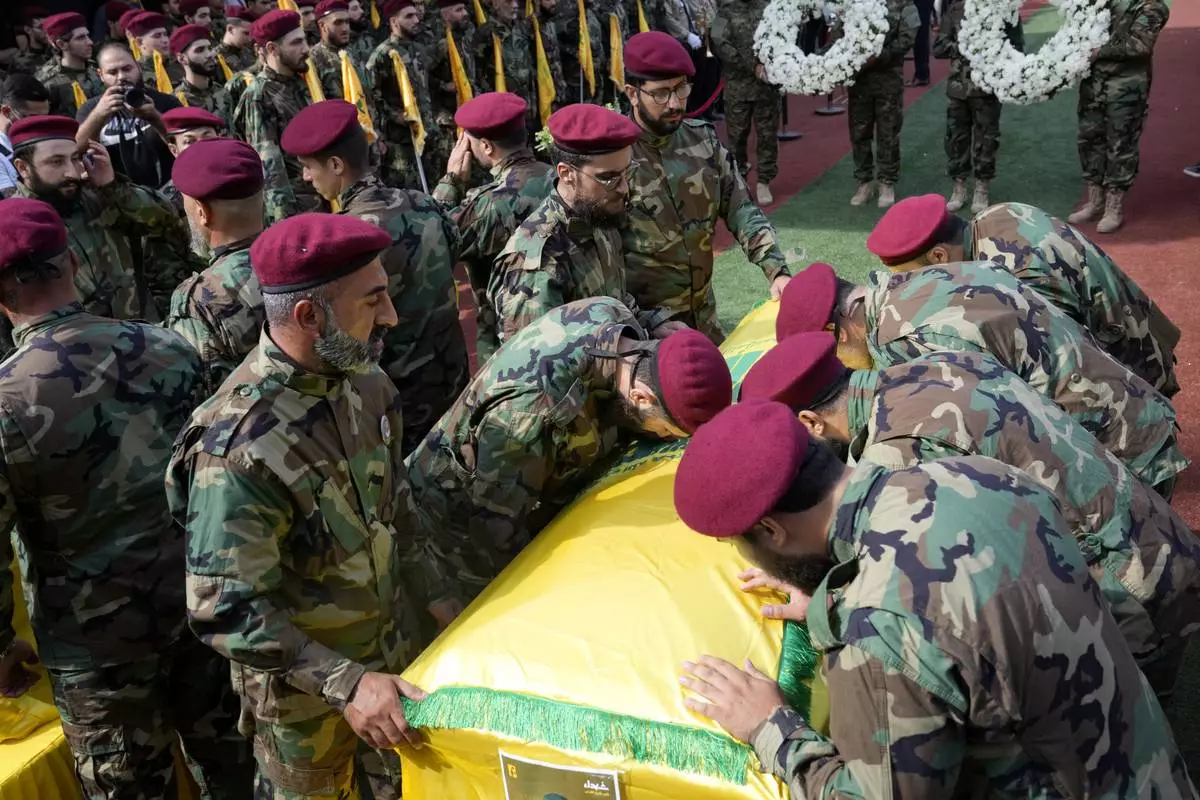
Hezbollah members mourn over the coffins of two of their comrades who were killed on Wednesday when a handheld device exploded, during a funeral procession in the southern suburbs of Beirut, Thursday, Sept. 19, 2024. (AP Photo/Hussein Malla)
MAGDEBURG, Germany (AP) — Germans on Saturday mourned both the victims and their shaken sense of security after a Saudi doctor intentionally drove into a Christmas market teeming with holiday shoppers, killing at least five people, including a small child, and injuring at least 200 others.
Authorities arrested a 50-year-old man at the site of the attack in Magdeburg on Friday evening and took him into custody for questioning. He has lived in Germany for nearly two decades, practicing medicine in Bernburg, about 40 kilometers (25 miles) south of Magdeburg. officials said.
The governor of the surrounding state of Saxony-Anhalt, Reiner Haseloff, told reporters that the death toll rose from two to five and that more than 200 people in total were injured.
Chancellor Olaf Scholz said that nearly 40 of them "are so seriously injured that we must be very worried about them.”
Several German media outlets identified the suspect as Taleb A., withholding his last name in line with privacy laws, and reported that he was a specialist in psychiatry and psychotherapy.
Mourners lit candles and placed flowers outside a church near the market on the cold and gloomy day. Several people stopped and cried. A Berlin church choir whose members witnessed a previous Christmas market attack in 2016 sang Amazing Grace, a hymn about God's mercy, offering their prayers and solidarity with the victims.
There were still no answers Saturday as to what caused him to drive into a crowd in the eastern German city of Magdeburg.
Describing himself as a former Muslim, the suspect shared dozens of tweets and retweets daily focusing on anti-Islam themes, criticizing the religion and congratulating Muslims who left the faith.
He also accused German authorities of failing to do enough to combat what he said was the “Islamism of Europe.” Some described him as an activist who helped Saudi women flee their homeland. He has also voiced support for the far-right and anti-immigrant Alternative for Germany (AfD) party.
Recently, he seemed focused on his theory that German authorities have been targeting Saudi asylum seekers.
Prominent German terrorism expert Peter Neumann said he had yet to come across a suspect in an act of mass violence with that profile.
“After 25 years in this ‘business’ you think nothing could surprise you anymore. But a 50-year-old Saudi ex-Muslim who lives in East Germany, loves the AfD and wants to punish Germany for its tolerance towards Islamists — that really wasn’t on my radar, " Neumann, the director of the International Centre for the Study of Radicalization and Political Violence at King’s College London, wrote on X.
“As things stand, he is a lone perpetrator, so that as far as we know there is no further danger to the city,” Saxony-Anhalt’s governor, Reiner Haseloff, told reporters. “Every human life that has fallen victim to this attack is a terrible tragedy and one human life too many.”
The violence shocked Germany and the city, bringing its mayor to the verge of tears and marring a festive event that’s part of a centuries-old German tradition. It prompted several other German towns to cancel their weekend Christmas markets as a precaution and out of solidarity with Magdeburg’s loss. Berlin kept its markets open but has increased its police presence at them.
Germany has suffered a string of extremist attacks in recent years, including a knife attack that killed three people and wounded eight at a festival in the western city of Solingen in August.
Magdeburg is a city of about 240,000 people, west of Berlin, that serves as Saxony-Anhalt’s capital. Friday’s attack came eight years after an Islamic extremist drove a truck into a crowded Christmas market in Berlin, killing 13 people and injuring many others. The attacker was killed days later in a shootout in Italy.
Chancellor Scholz and Interior Minister Nancy Faeser traveled to Magdeburg on Saturday, and a memorial service is to take place in the city cathedral in the evening. Faeser ordered flags lowered to half-staff at federal buildings across the country.
Verified bystander footage distributed by the German news agency dpa showed the suspect’s arrest at a tram stop in the middle of the road. A nearby police officer pointing a handgun at the man shouted at him as he lay prone, his head arched up slightly. Other officers swarmed around the suspect and took him into custody.
Thi Linh Chi Nguyen, a 34-year-old manicurist from Vietnam whose salon is located in a mall across from the Christmas market, was on the phone during a break when she heard loud bangs and thought at first they were fireworks. She then saw a car drive through the market at high speed. People screamed and a child was thrown into the air by the car.
Shaking as she described the horror of what she witnessed, she recalled seeing the car bursting out of the market and turning right onto Ernst-Reuter-Allee street and then coming to a standstill at the tram stop where the suspect was arrested.
The number of injured people was overwhelming.
“My husband and I helped them for two hours. He ran back home and grabbed as many blankets as he could find because they didn’t have enough to cover the injured people. And it was so cold," she said.
The market itself was still cordoned off Saturday with red-and-white tape and police vans every 50 meters (about 54 yards). Police with machine pistols guarded every entry to the market.
Some thermal security blankets still lay on the street.
Christmas markets are a German holiday tradition cherished since the Middle Ages, now successfully exported to much of the Western world.
Saudi Arabia’s foreign ministry condemned the attack on X.
Aboubakr reported from Cairo and Gera from Warsaw, Poland.
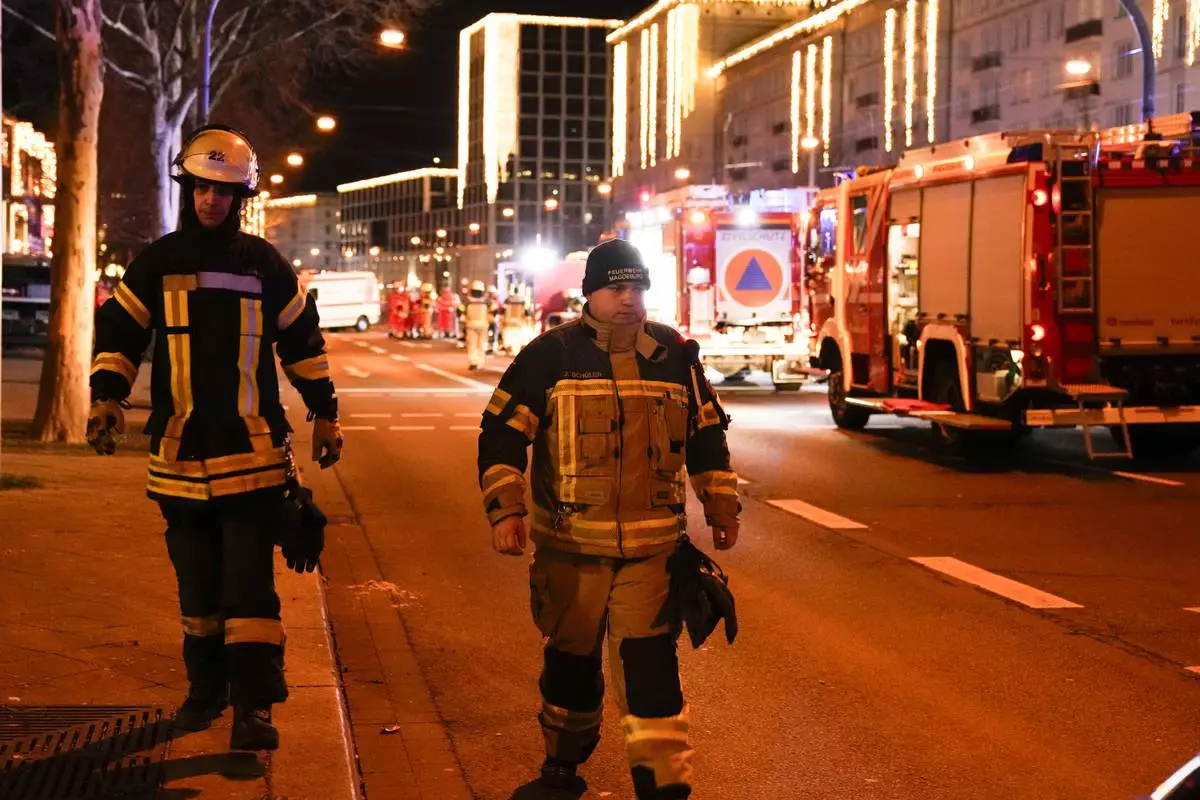
Two firefighters walk through a cordoned-off area near a Christmas Market, after a car drove into a crowd in Magdeburg, Germany, Saturday, Dec. 21, 2024. (AP Photo/Ebrahim Noroozi)
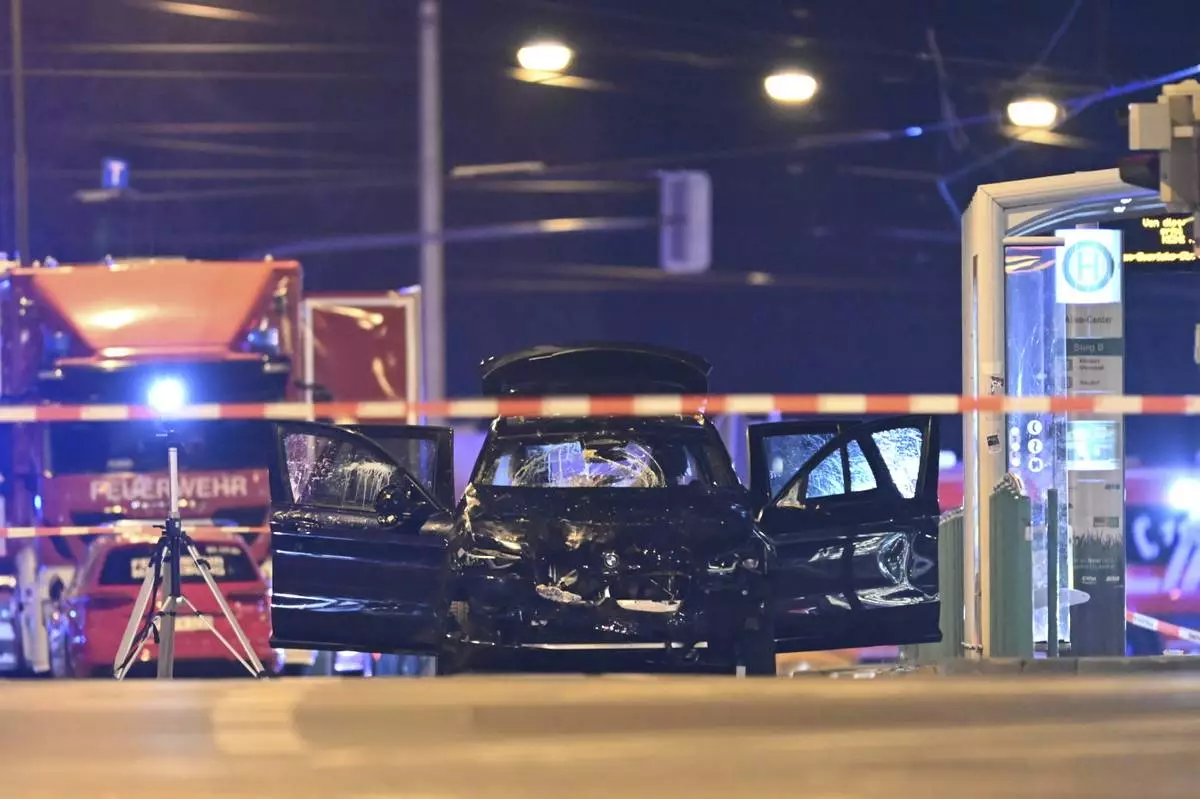
A damaged car sits with its doors open after a driver plowed into a busy Christmas market in Magdeburg, Germany, early Saturday, Dec. 21, 2024. (Hendrik Schmidt/dpa via AP)

Police stand at a Christmas market in Magdeburg, Germany, early Saturday, Dec. 21, 2024, after a driver plowed into a group of people at the market late Friday. (Hendrik Schmidt/dpa via AP)

Police stand at a Christmas market in Magdeburg, Germany, early Saturday, Dec. 21, 2024, after a driver plowed into a group of people at the market late Friday. (Hendrik Schmidt/dpa via AP)
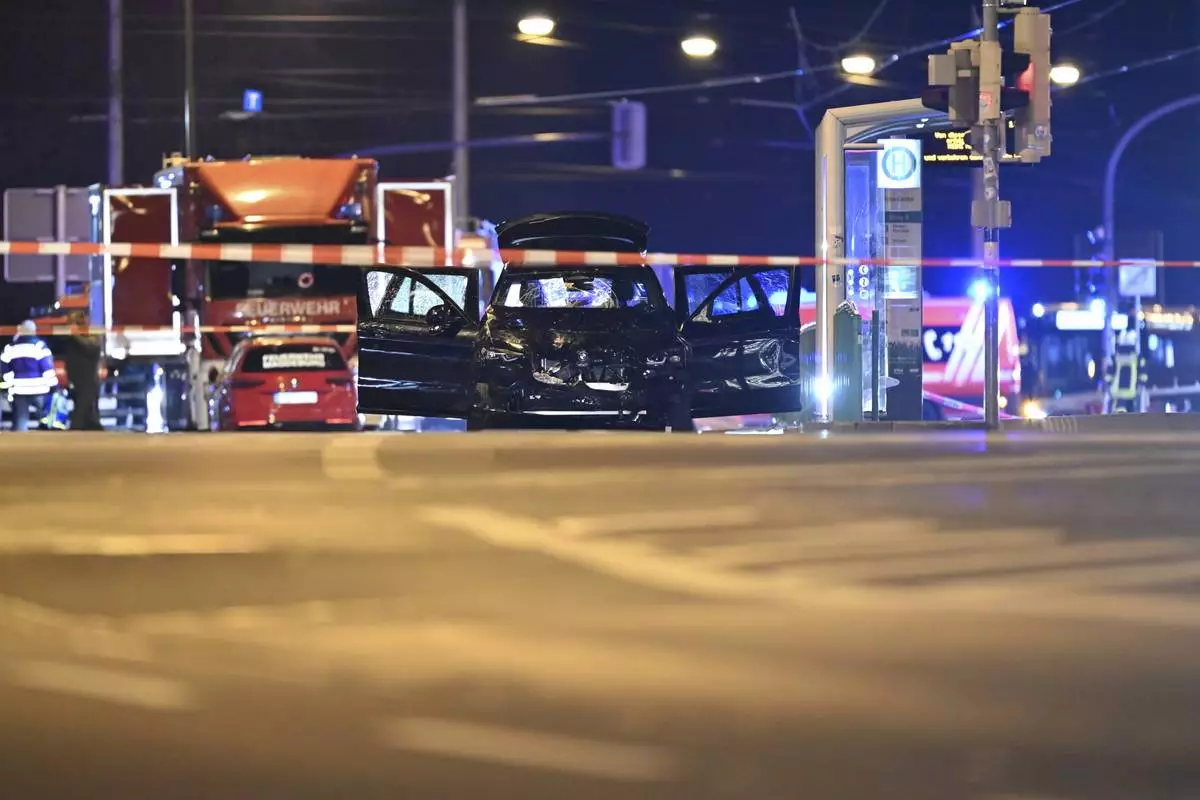
A damaged car sits with its doors open after a driver plowed into a busy Christmas market in Magdeburg, Germany, early Saturday, Dec. 21, 2024. (Hendrik Schmidt/dpa via AP)
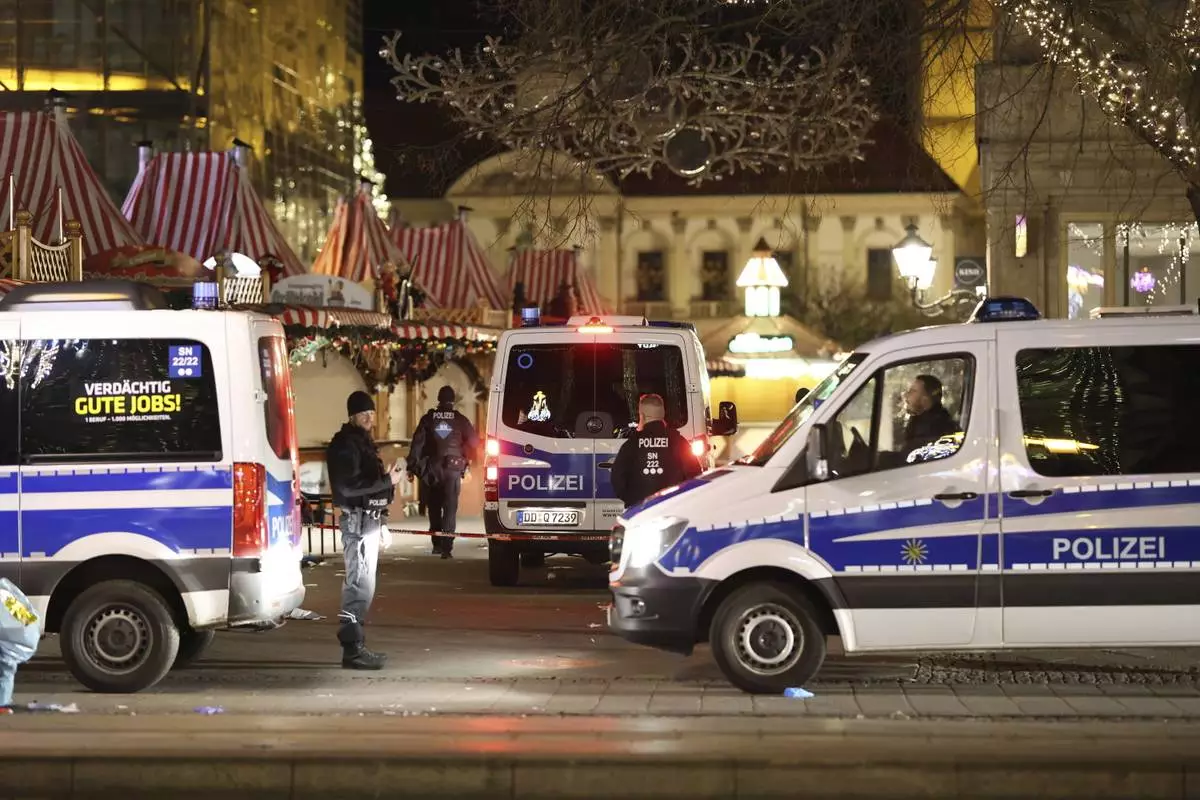
Police officers and police emergency vehicles are seen at the Christmas market in Magdeburg after a driver plowed into a busy Christmas market in Magdeburg, Germany, Saturday, Dec. 21, 2024. (Matthias Bein/dpa via AP)
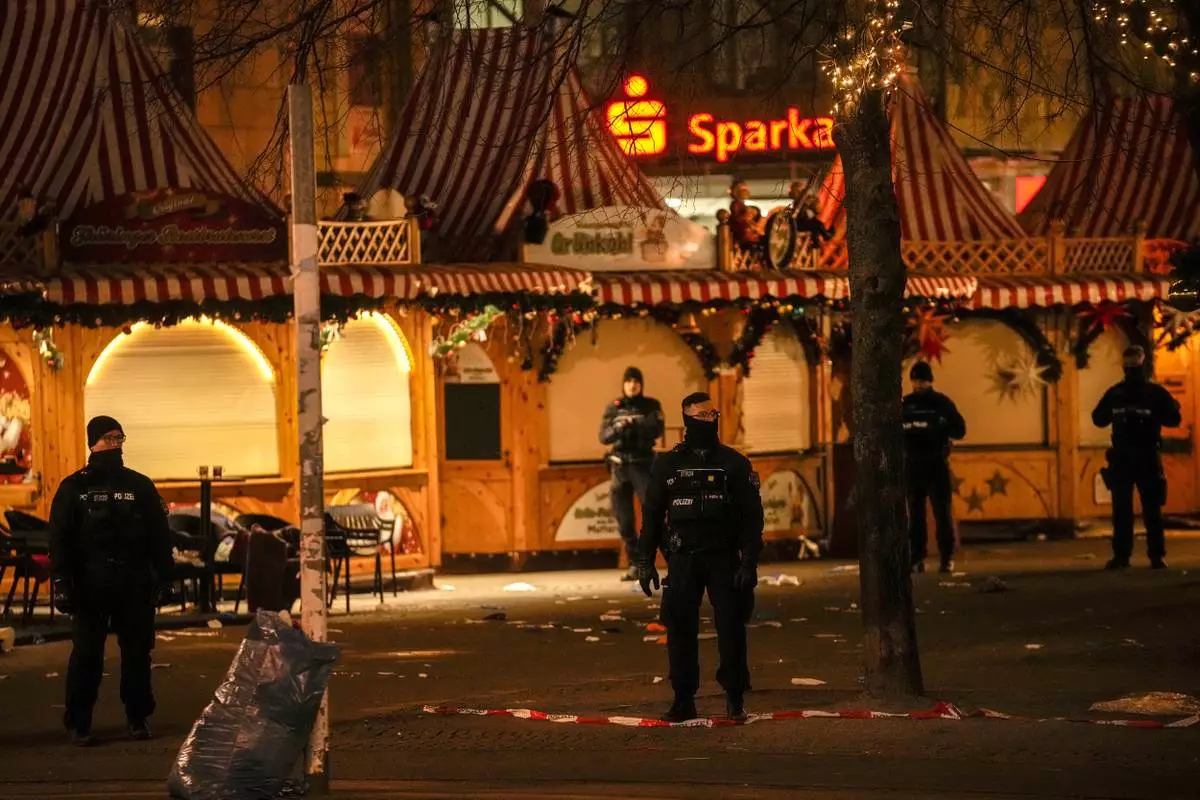
Security guards stand in front of a cordoned-off Christmas Market after a car crashed into a crowd of people, in Magdeburg, Germany, Saturday early morning, Dec. 21, 2024. (AP Photo/Ebrahim Noroozi)
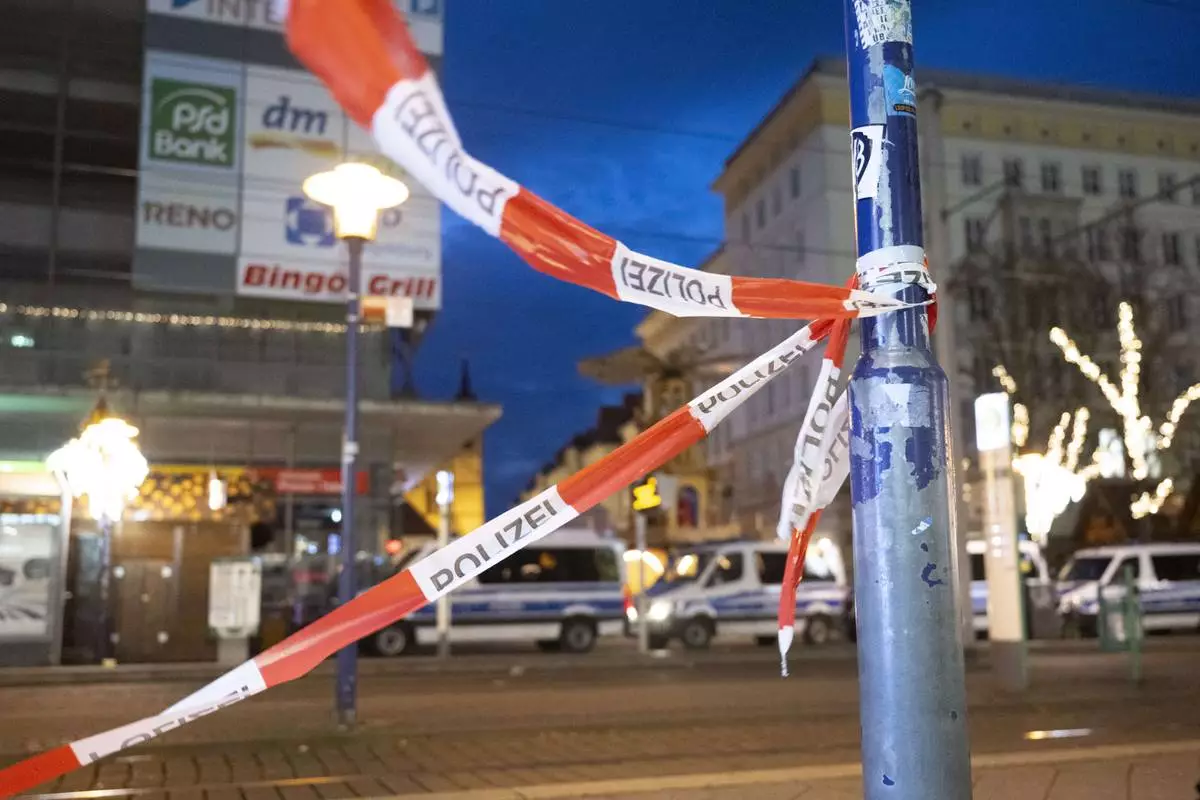
A barrier tape and police vehicles are seen in front of the entrance to the Christmas market in Magdeburg after a driver plowed into a busy Christmas market in Magdeburg, Germany, Saturday, Dec. 21, 2024. (Sebastian Kahnert/dpa via AP)
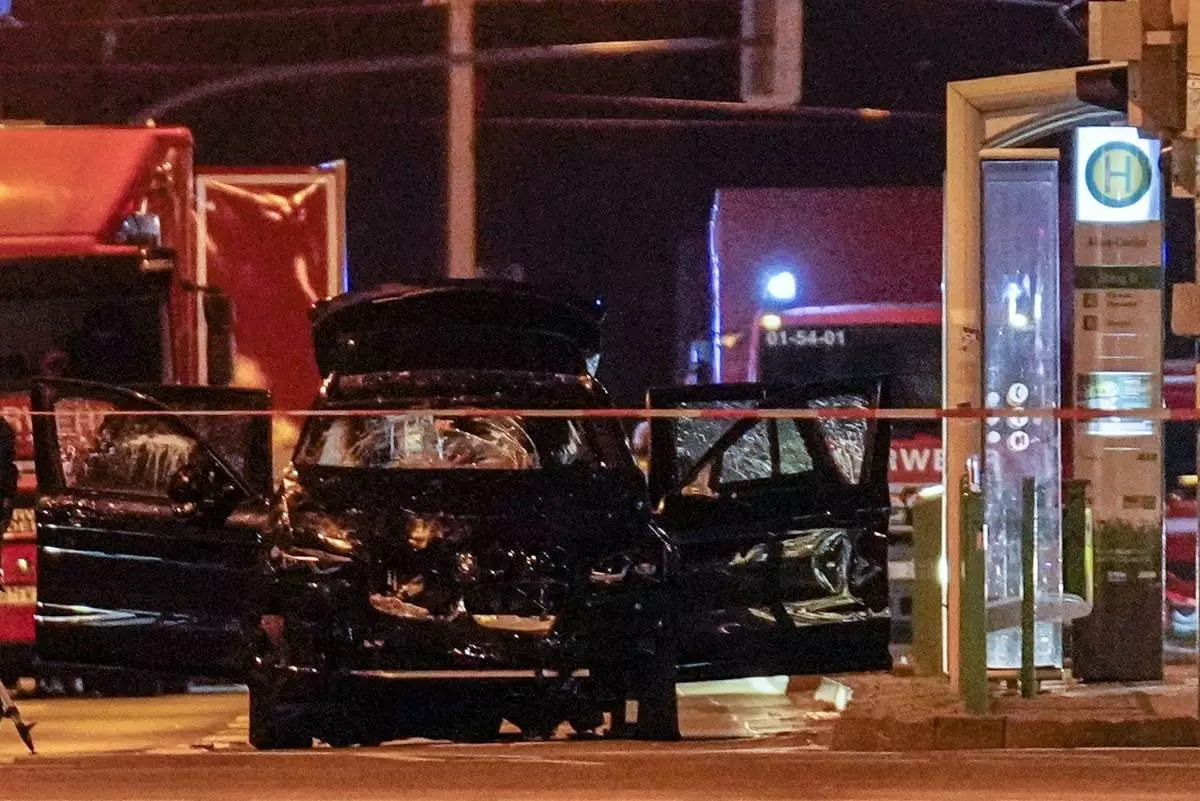
The car that was crashed into a crowd of people at the Magdeburg Christmas market is seen following the attack in Magdeburg, Germany, Saturday early morning, Dec. 21, 2024. (AP Photo/Ebrahim Noroozi)
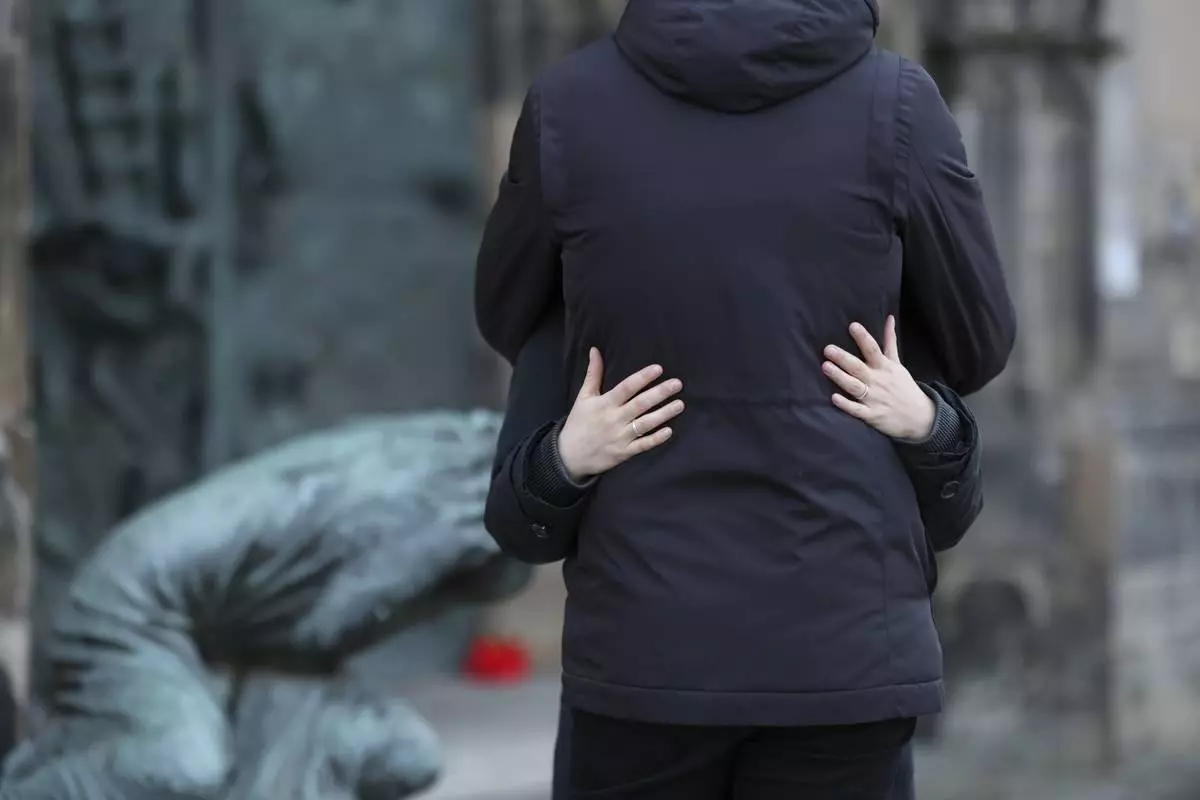
People mourn in front of St. John's Church for the victims of Friday's attack at the Christmas market in Magdeburg, Germany, Saturday, Dec. 21, 2024. (Matthias Bein/dpa via AP)
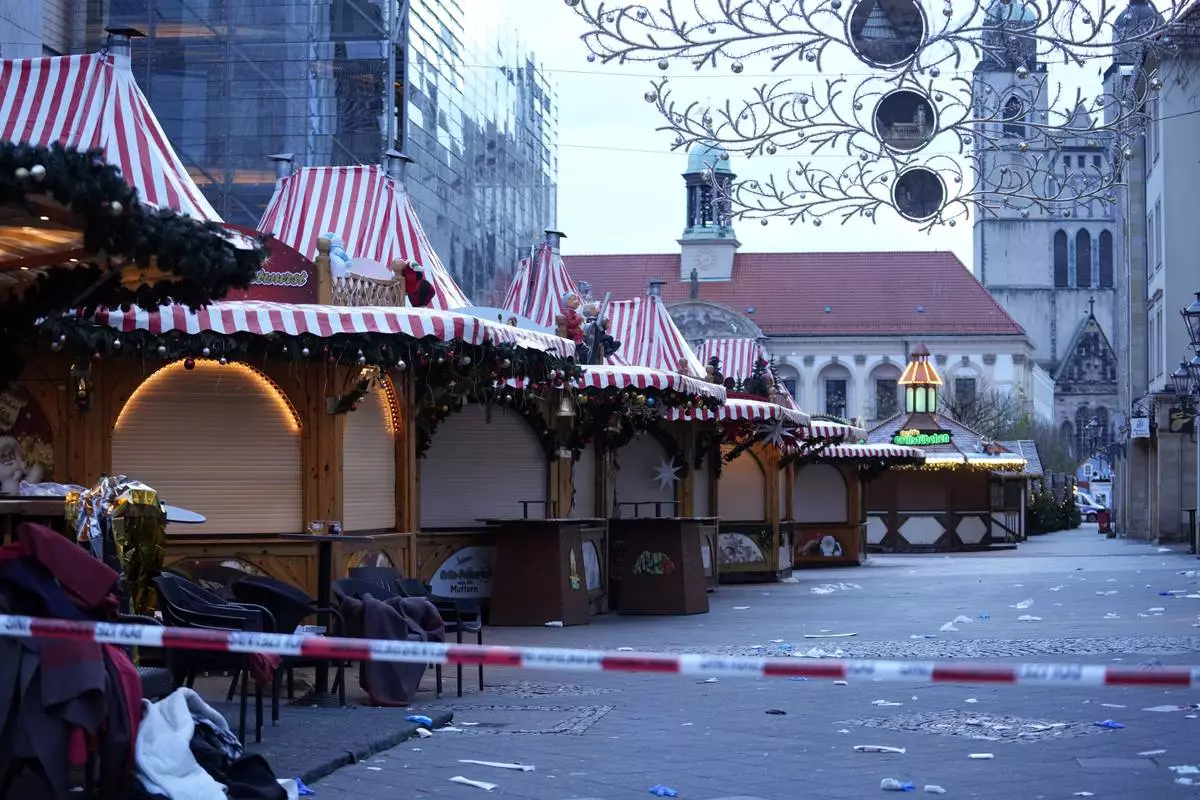
Police tape cordons-off a Christmas Market, where a car drove into a crowd on Friday evening, in Magdeburg, Germany, Saturday, Dec. 21, 2024. (AP Photo/Ebrahim Noroozi)
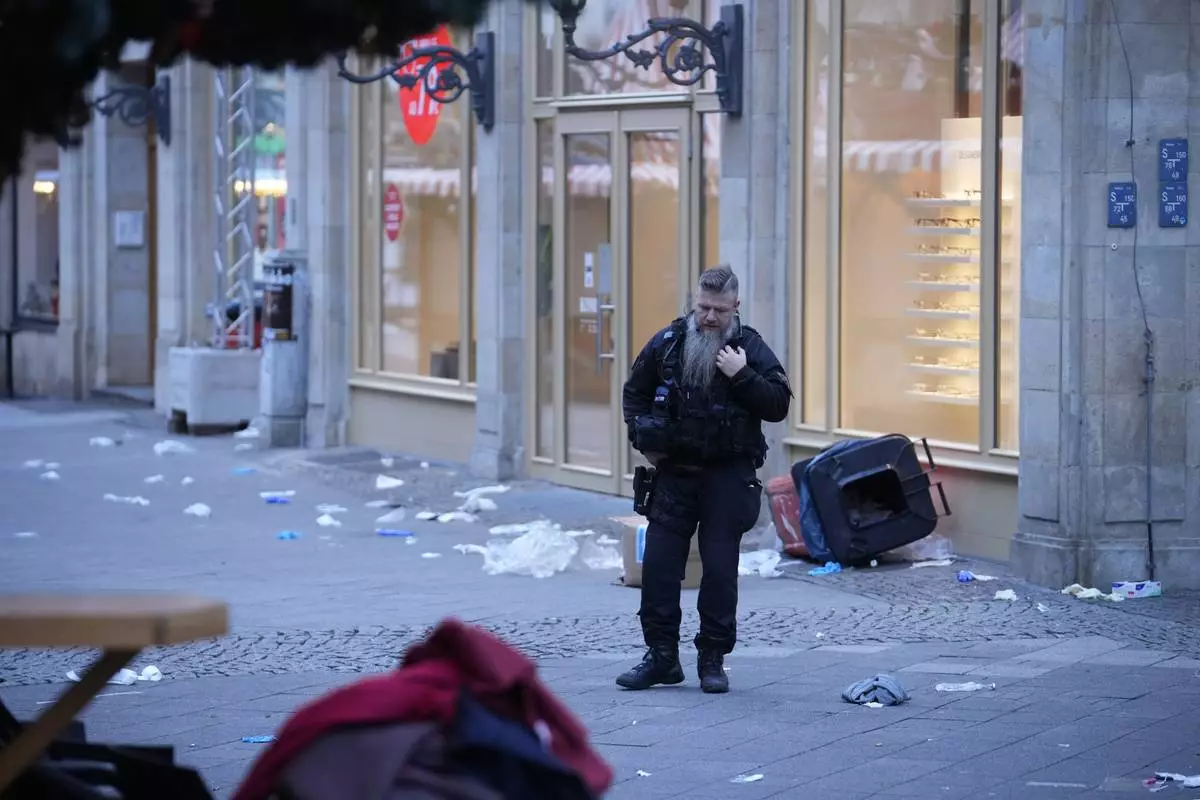
A police officer stands guard at at a cordoned-off area near a Christmas Market, where a car drove into a crowd on Friday evening, in Magdeburg, Germany, Saturday, Dec. 21, 2024. (AP Photo/Ebrahim Noroozi)
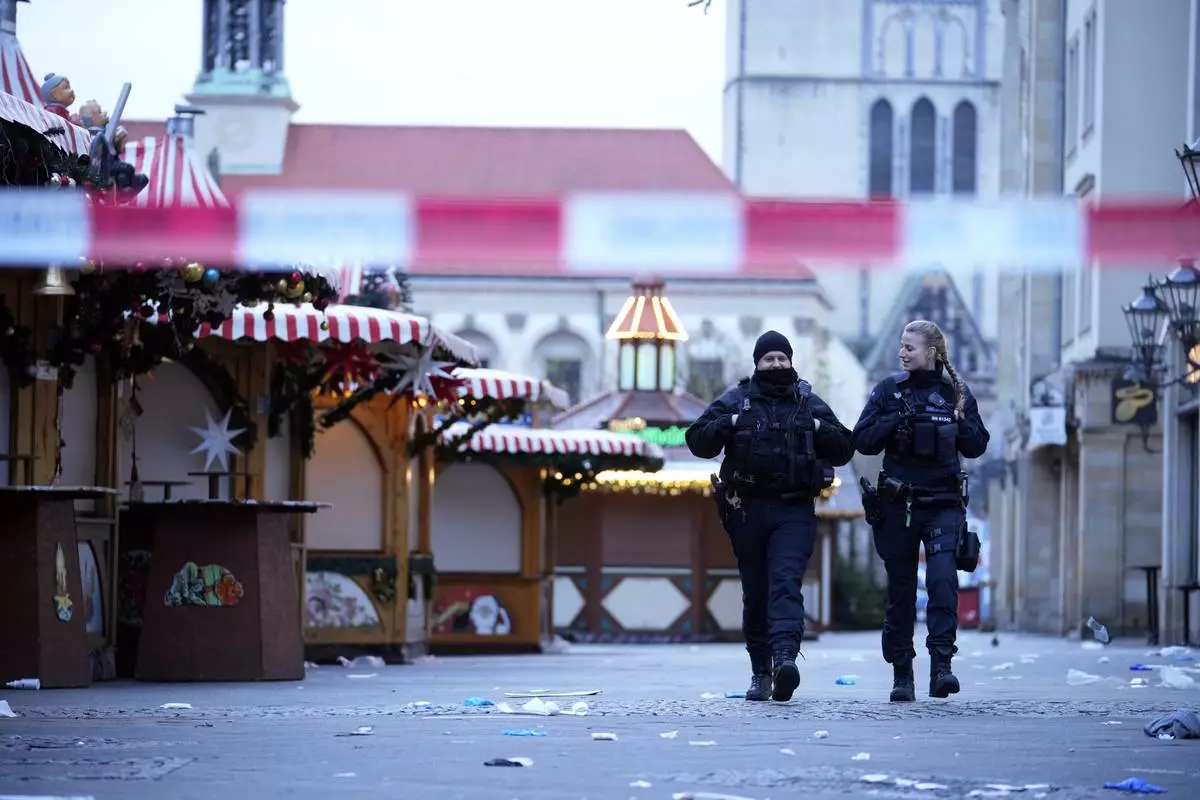
Police officers patrol a cordoned-off area at a Christmas Market, where a car drove into a crowd on Friday evening, in Magdeburg, Germany, Saturday, Dec. 21, 2024. (AP Photo/Ebrahim Noroozi)

Security guards stand in front of a cordoned-off Christmas Market after a car crashed into a crowd of people, in Magdeburg, Germany, Saturday, Dec. 21, 2024. (AP Photo/Ebrahim Noroozi)
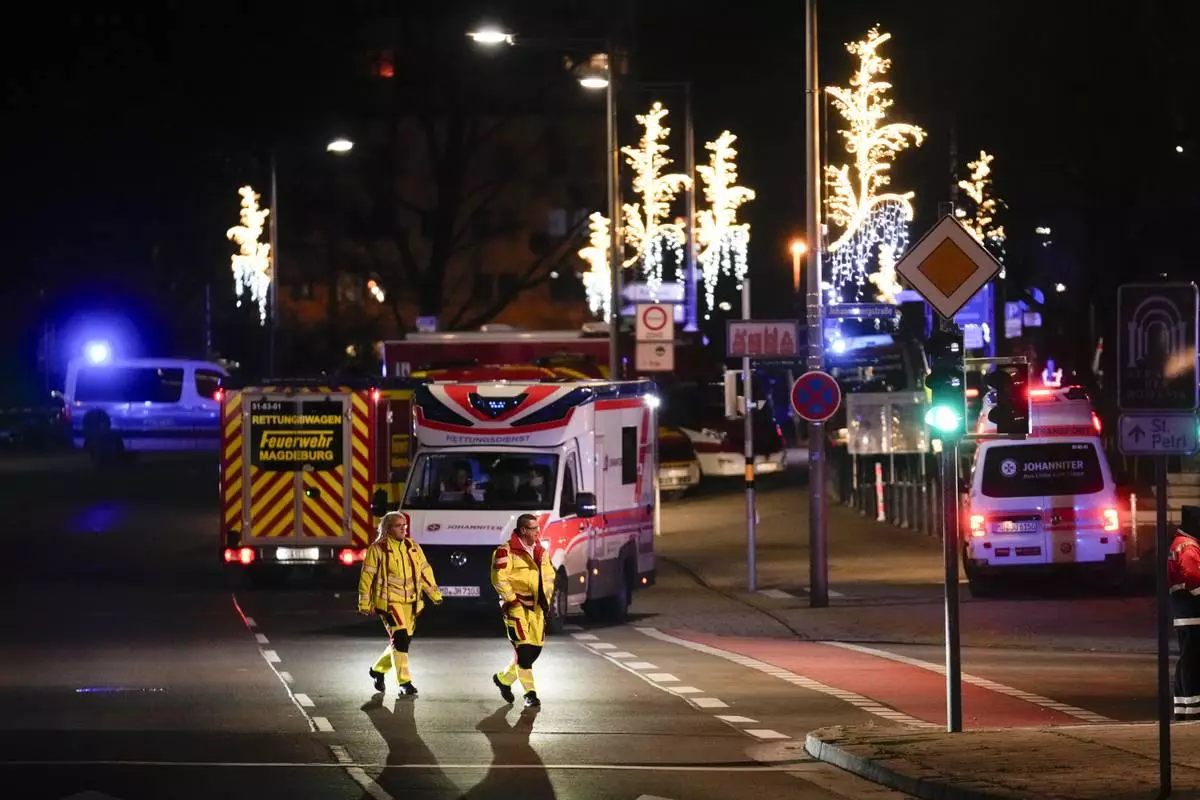
Emergency services work in a cordoned-off area near a Christmas Market, after a car drove into a crowd in Magdeburg, Germany, Saturday, Dec. 21, 2024. (AP Photo/Ebrahim Noroozi)
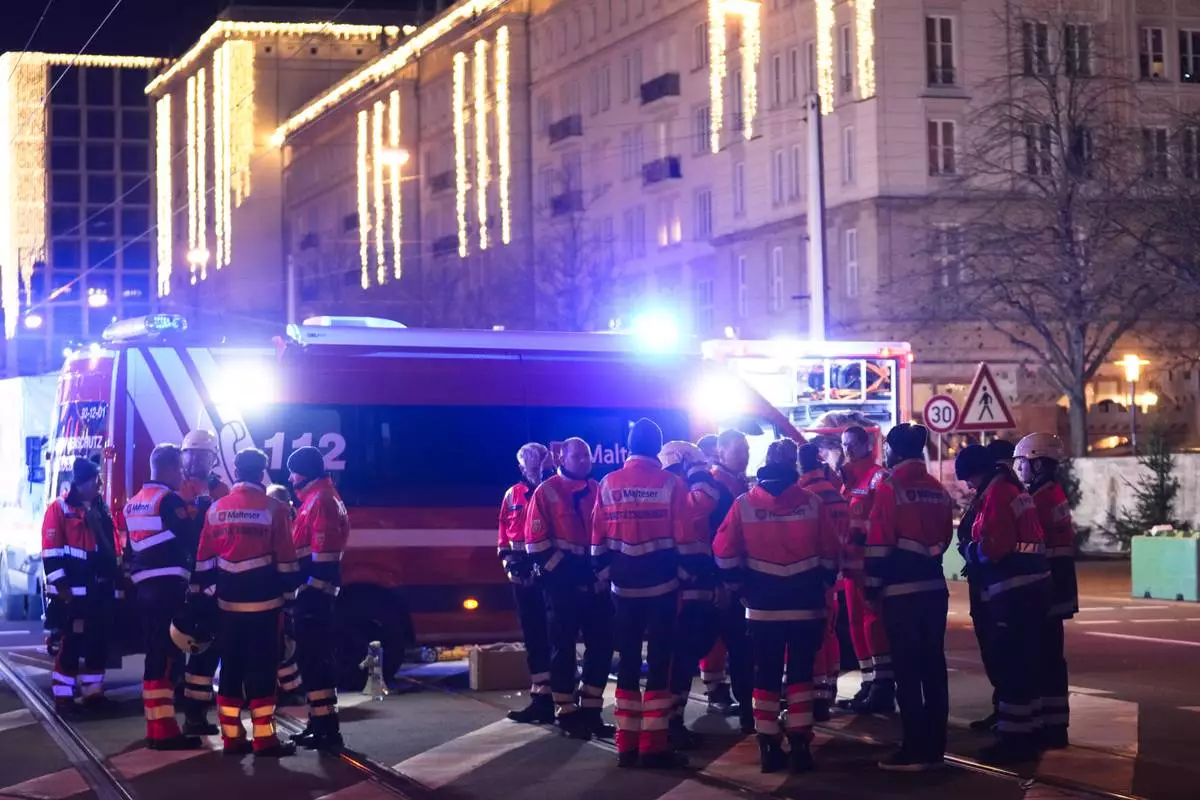
Emergency services work in a cordoned-off area near a Christmas Market, after a car drove into a crowd in Magdeburg, Germany, Friday, Dec. 20, 2024. (AP Photo/Ebrahim Noroozi)
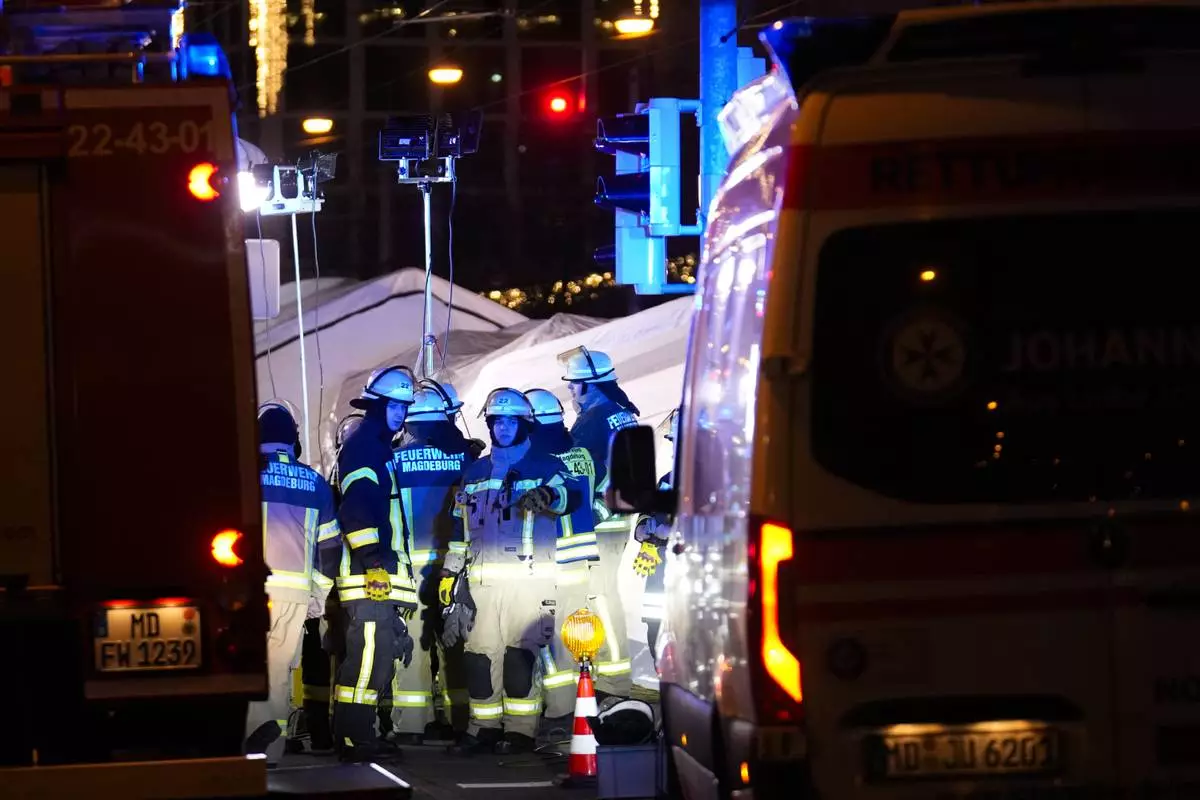
Emergency services work in a cordoned-off area near a Christmas Market, after a car drove into a crowd in Magdeburg, Germany, Friday, Dec. 20, 2024. (AP Photo/Ebrahim Noroozi)

Reiner Haseloff, Minister President of Saxony-Anhalt, center, is flanked by Tamara Zieschang, Minister of the Interior and Sport of Saxony-Anhalt, left, and Simone Borris, Mayor of the City of Magdeburg, at a press conference after a car plowed into a busy outdoor Christmas market in Magdeburg, Germany Friday, Dec. 20, 2024. (Hendrik Schmidt/dpa via AP)
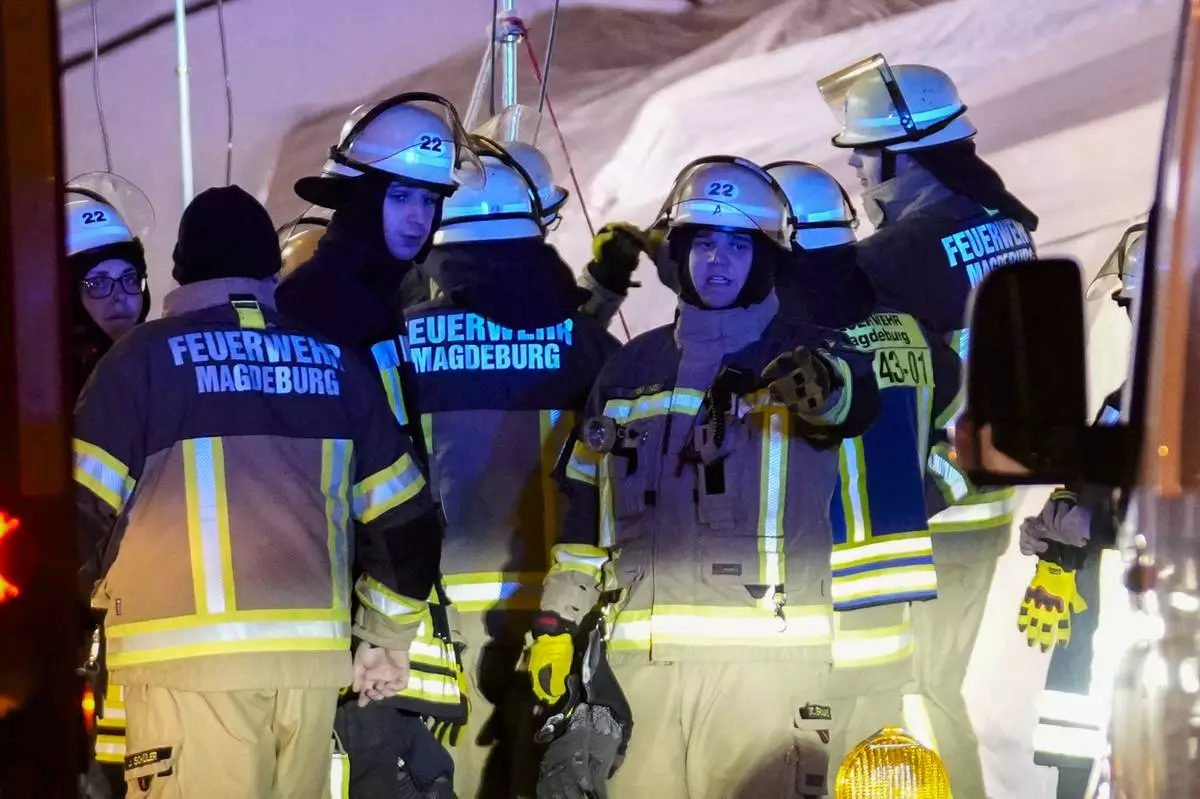
Emergency services work in a cordoned-off area near a Christmas Market, after a car drove into a crowd in Magdeburg, Germany, Friday, Dec. 20, 2024. (AP Photo/Ebrahim Noroozi)
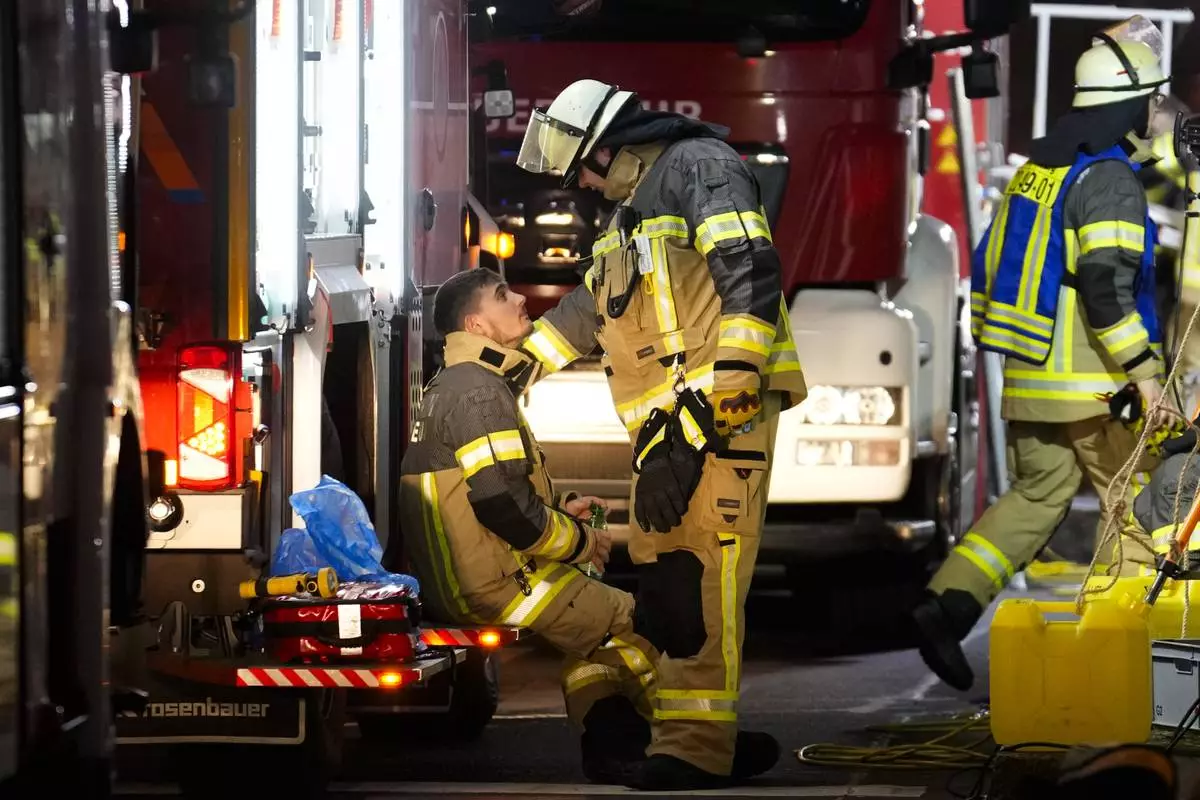
Emergency services work in a cordoned-off area near a Christmas Market, after a car drove into a crowd in Magdeburg, Germany, Friday, Dec. 20, 2024. (AP Photo/Ebrahim Noroozi)
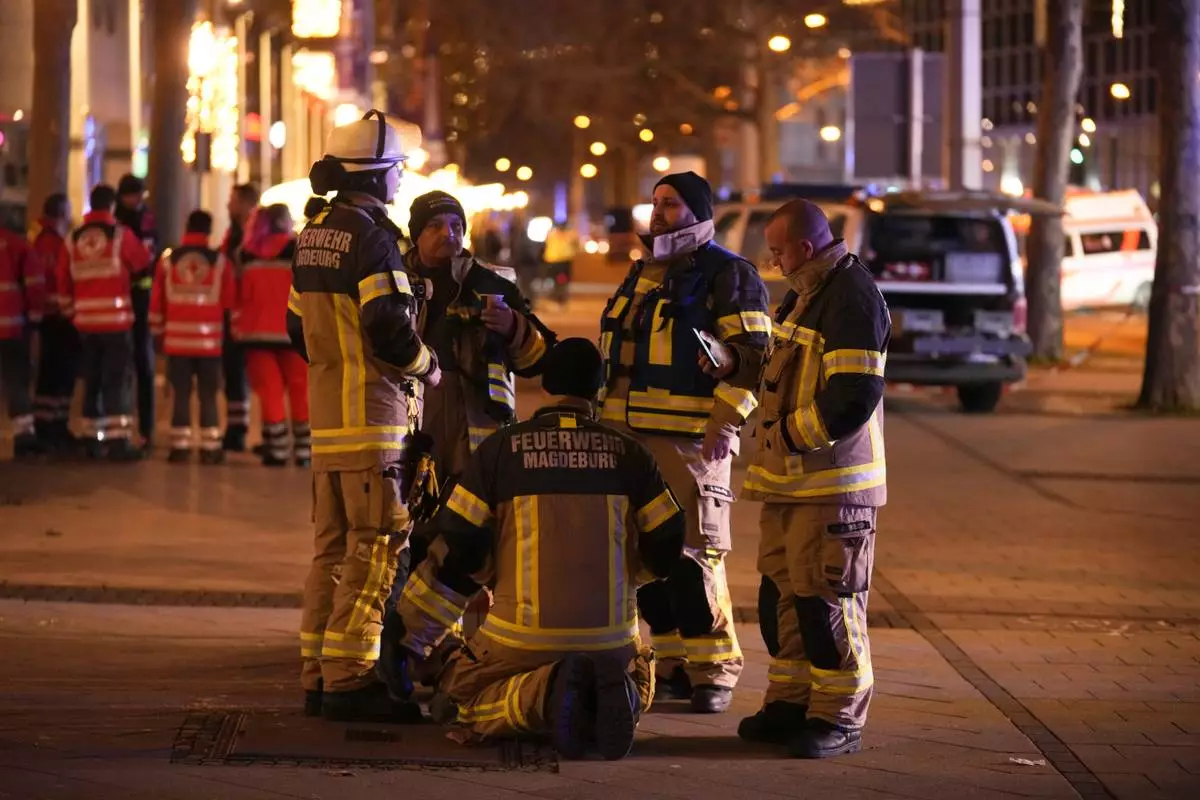
Emergency services work in a cordoned-off area near a Christmas Market, after a car drove into a crowd in Magdeburg, Germany, Friday, Dec. 20, 2024. (AP Photo/Ebrahim Noroozi)

A police officer guards at a blocked road near a Christmas Market, after an incident in Magdeburg, Germany, Friday, Dec. 20, 2024. (AP Photo/Ebrahim Noroozi)
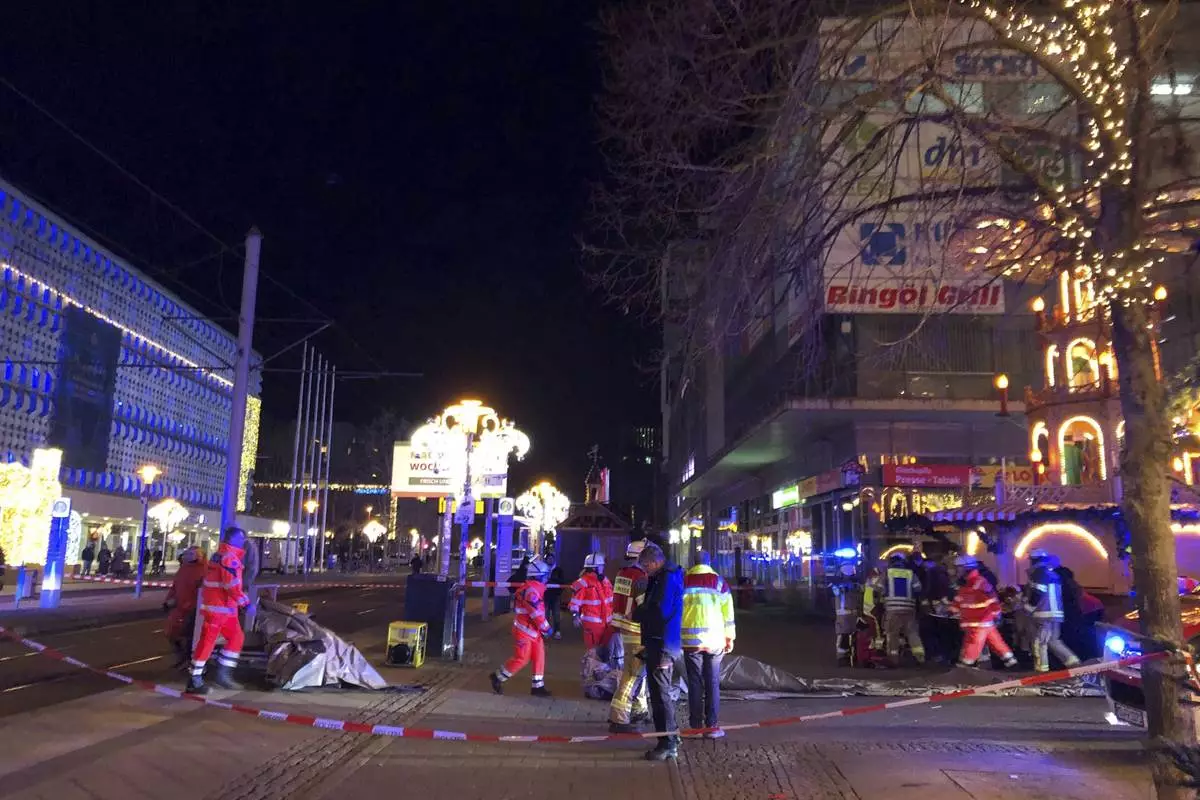
Emergency services attend an incident at the Christmas market in Magdeburg, Germany, Friday Dec. 20, 2024. (Dörthe Hein/dpa via AP)
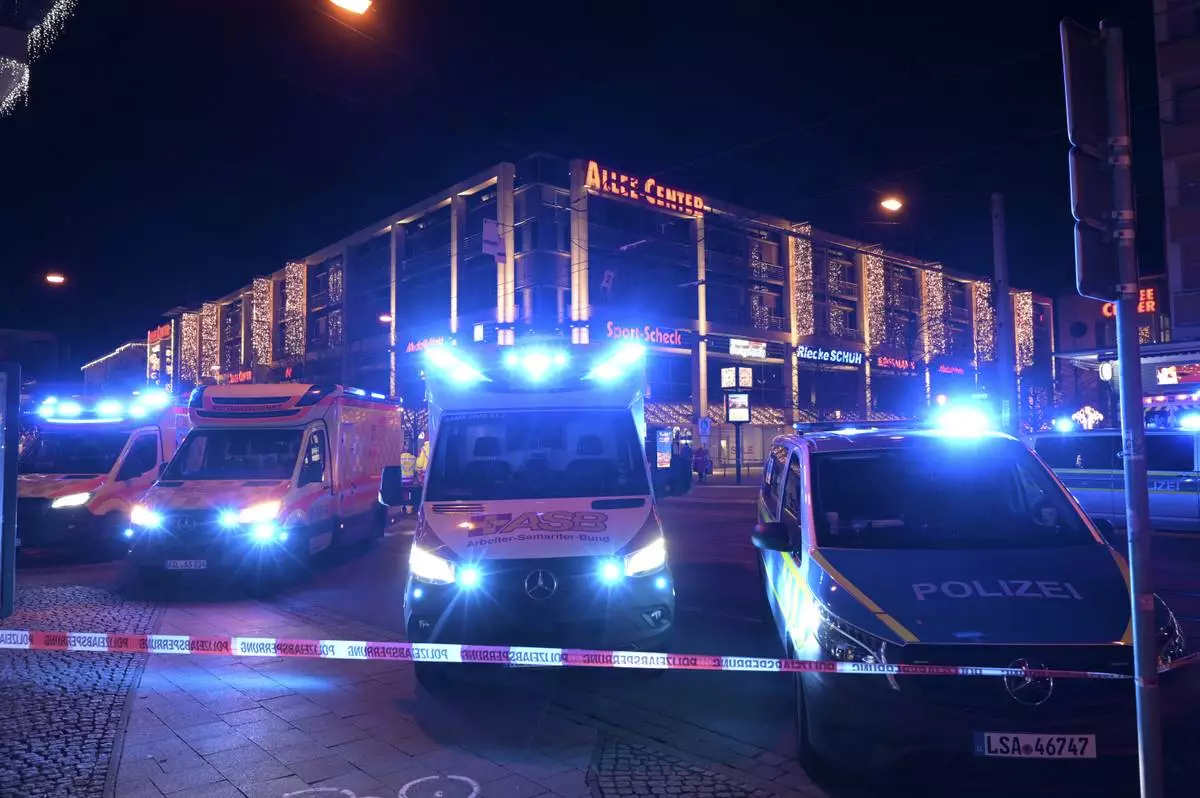
Emergency services attend an incident at the Christmas market in Magdeburg, Germany, Friday Dec. 20, 2024. (Heiko Rebsch/dpa via AP)
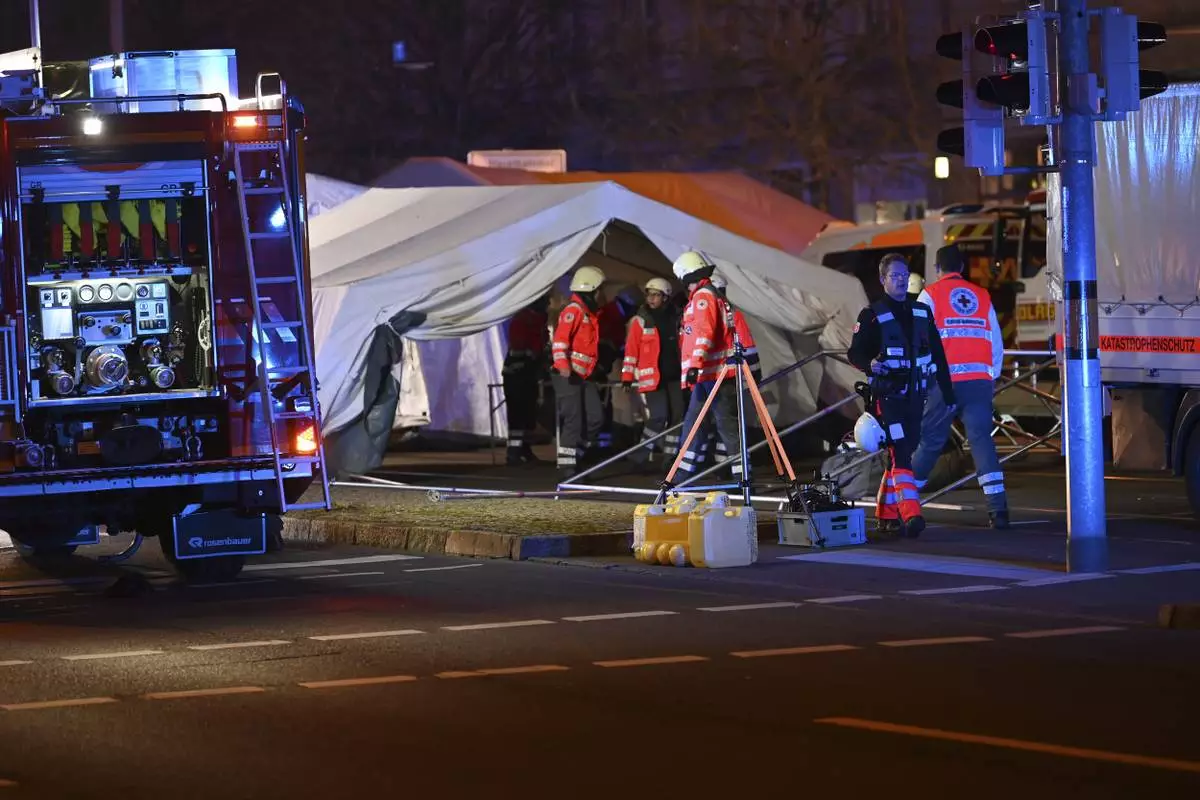
Emergency services attend an incident at the Christmas market in Magdeburg, Germany, Friday Dec. 20, 2024. (Heiko Rebsch/dpa via AP)

A police officer guards at a cordoned-off area near a Christmas Market after an incident in Magdeburg, Germany, Friday, Dec. 20, 2024. (AP Photo/Ebrahim Noroozi)
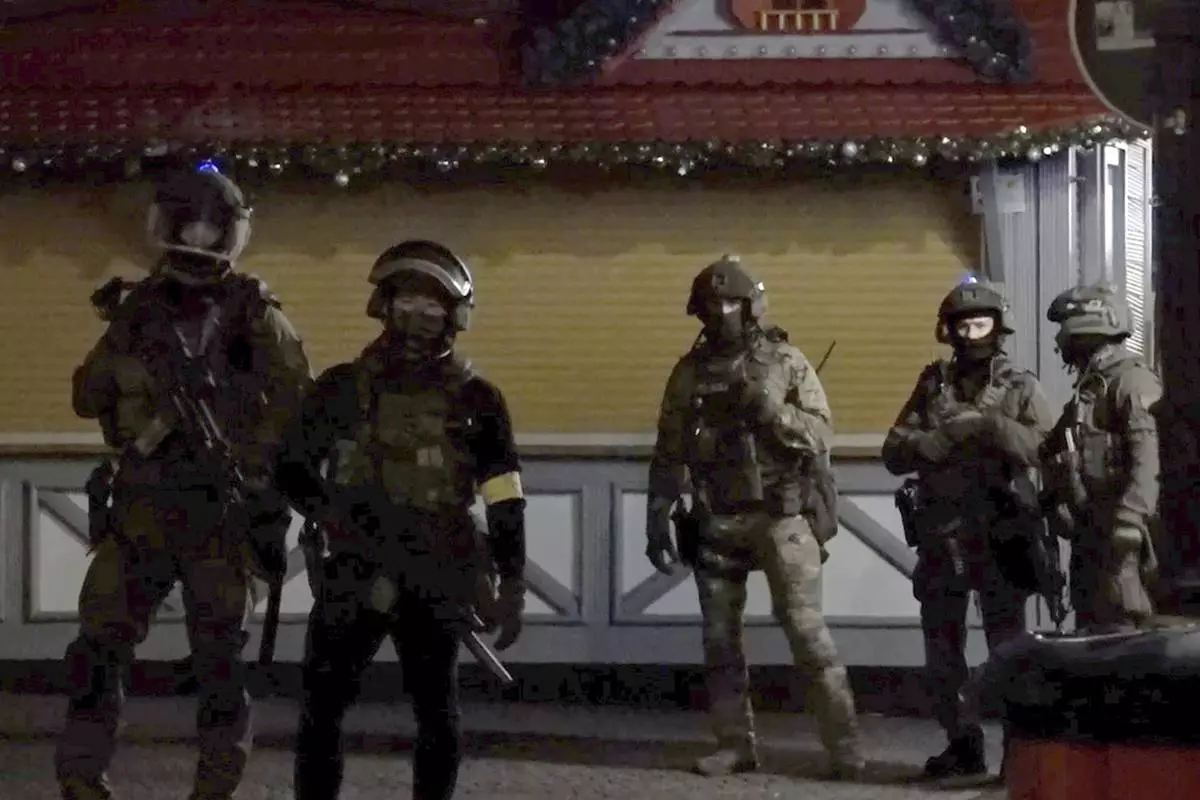
In this screen grab image from video, special police forces attend an incident at the Christmas market in Magdeburg, Germany, Friday Dec. 20, 2024. (Thomas Schulz/dpa via AP)
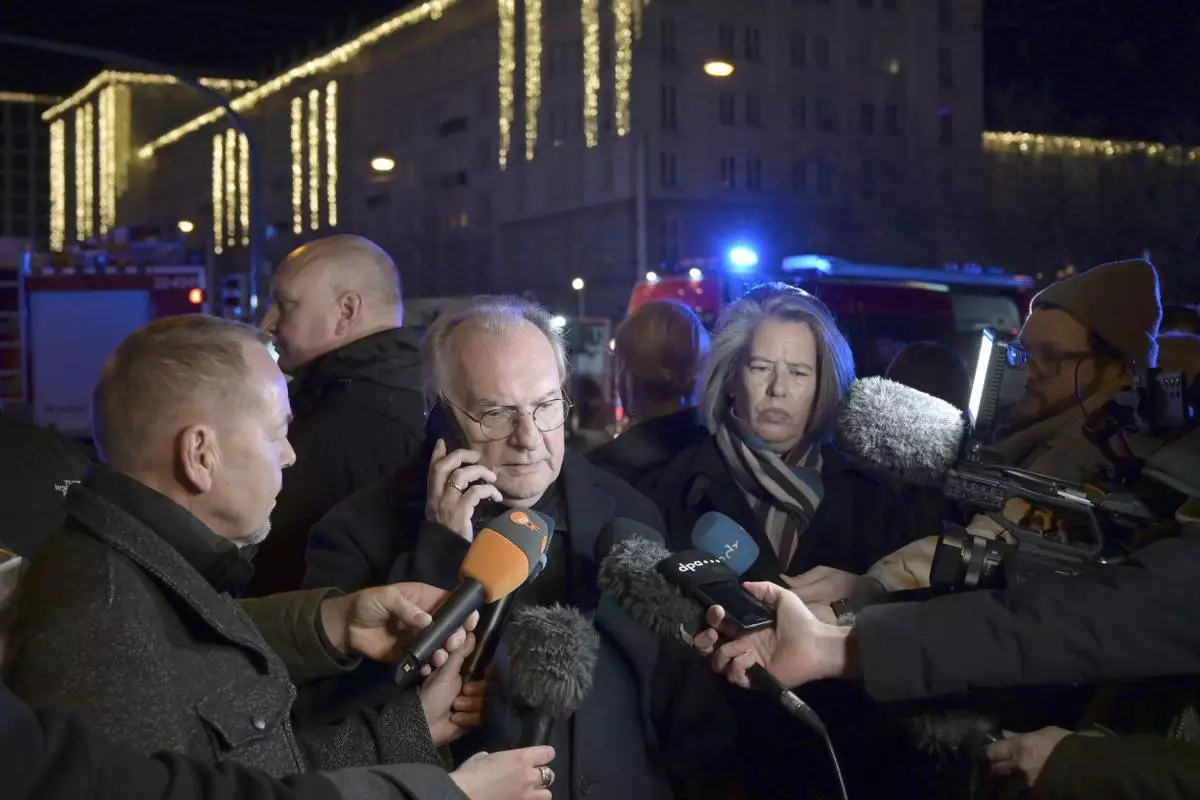
Reiner Haseloff (M, CDU), Minister President of Saxony-Anhalt, makes a statement after an incident at the Christmas market in Magdeburg, Germany, Friday Dec. 20, 2024. (Heiko Rebsch/dpa via AP)

A police officer speaks with a man at a cordoned-off area near a Christmas Market after an incident in Magdeburg, Germany, Friday, Dec. 20, 2024. (AP Photo/Ebrahim Noroozi)
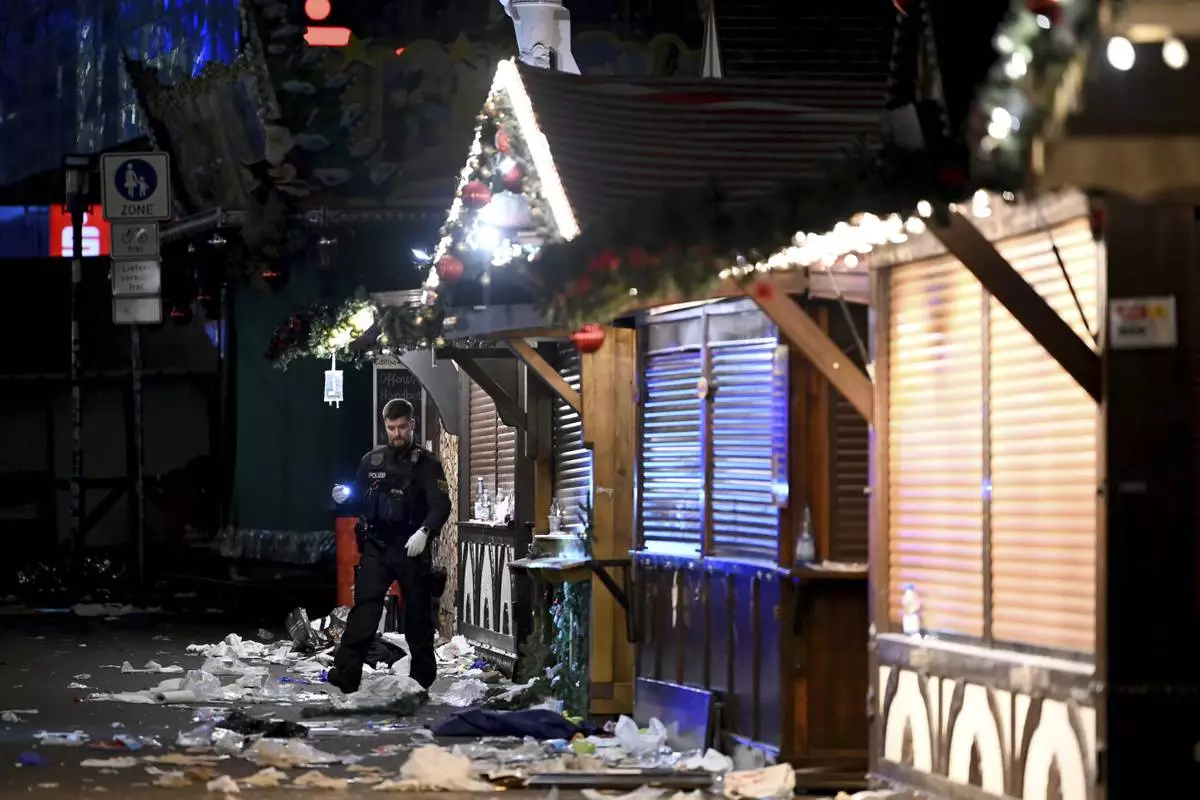
A policeman is seen at the Christmas market where an incident happened in Magdeburg, Germany, Friday Dec. 20, 2024. (Heiko Rebsch/dpa via AP)
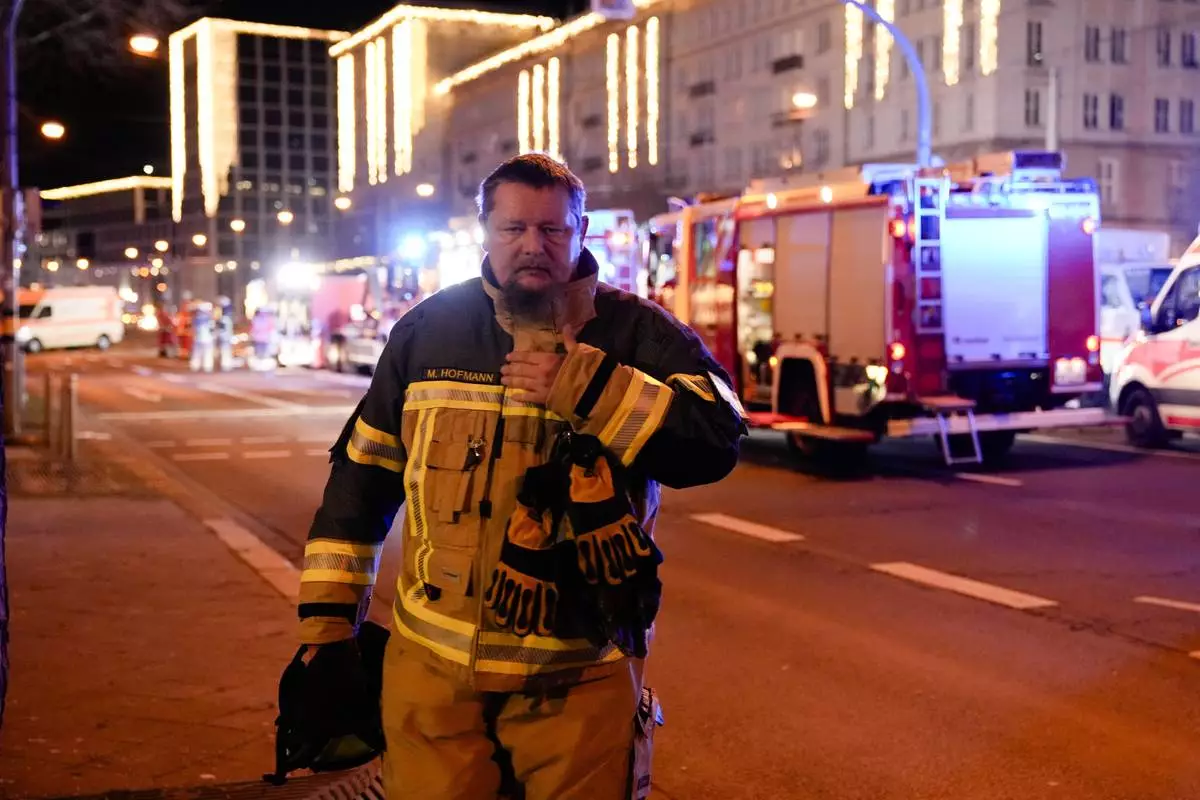
A firefighter walks through a cordoned-off area near a Christmas Market, after a car drove into a crowd in Magdeburg, Germany, Saturday, Dec. 21, 2024. (AP Photo/Ebrahim Noroozi)
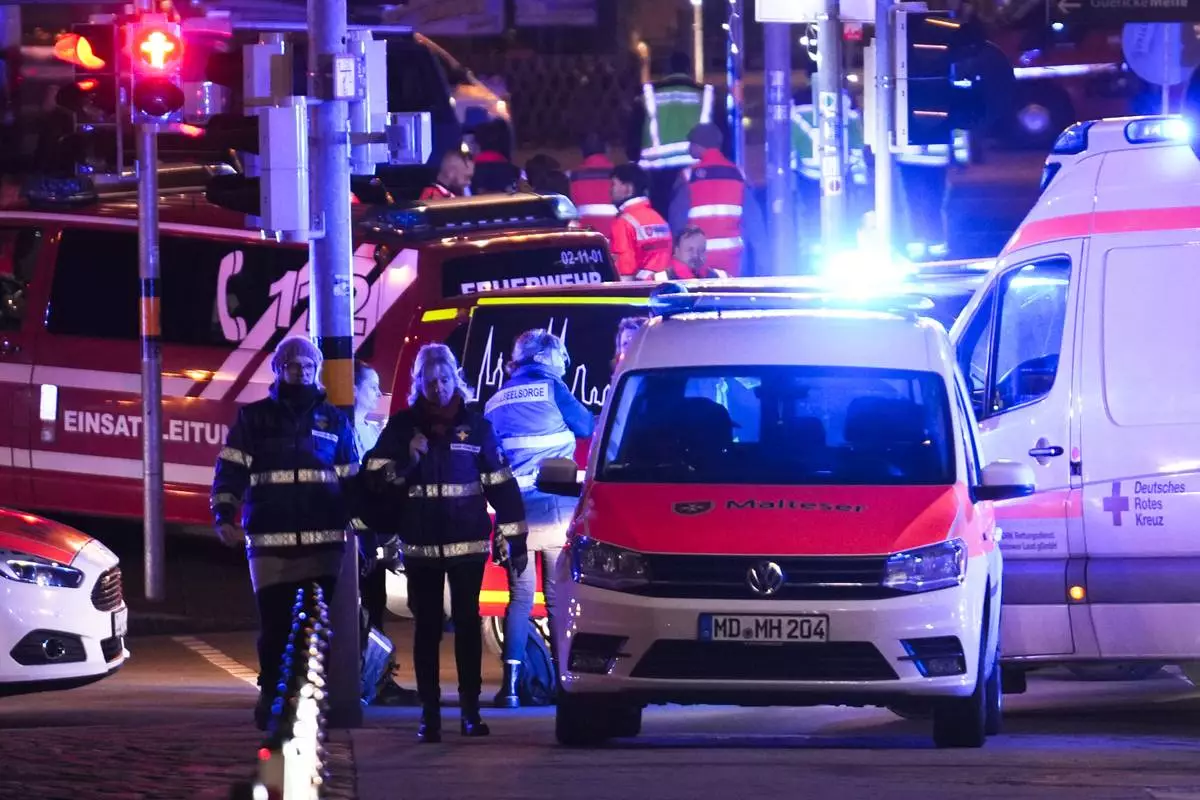
Emergency services work in a cordoned-off area near a Christmas Market, after an incident in Magdeburg, Germany, Friday, Dec. 20, 2024. (AP Photo/Ebrahim Noroozi)

A view of the cordoned-off Christmas market after an incident in Magdeburg, Germany, Friday Dec. 20, 2024. (Heiko Rebsch/dpa via AP)

A police officer guards at a blocked road near a Christmas market after an incident in Magdeburg, Germany, Friday, Dec. 20, 2024. (AP Photo/Ebrahim Noroozi)
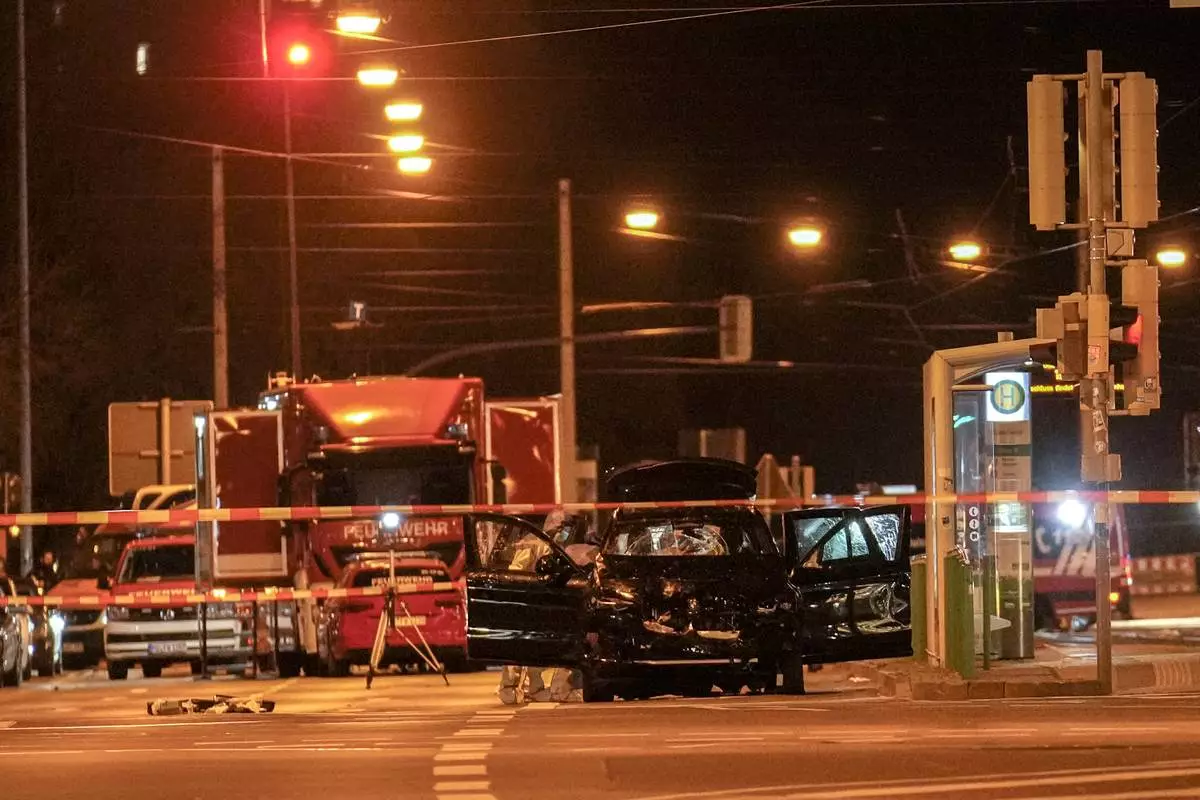
The car that was crashed into a crowd of people at the Magdeburg Christmas market is seen following the attack in Magdeburg, Germany, Saturday early morning, Dec. 21, 2024. (AP Photo/Ebrahim Noroozi)
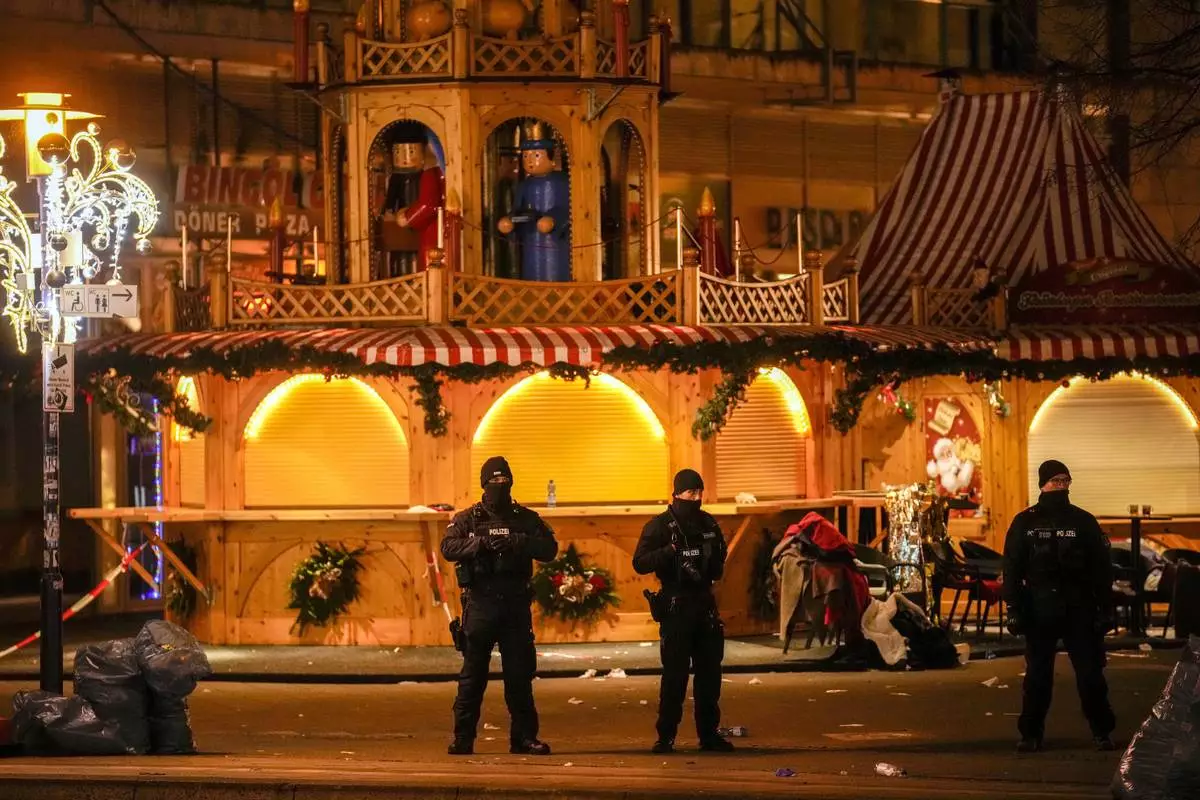
Security guards stand in front of a cordoned-off Christmas Market after a car crashed into a crowd of people, in Magdeburg, Germany, Saturday early morning, Dec. 21, 2024. (AP Photo/Ebrahim Noroozi)
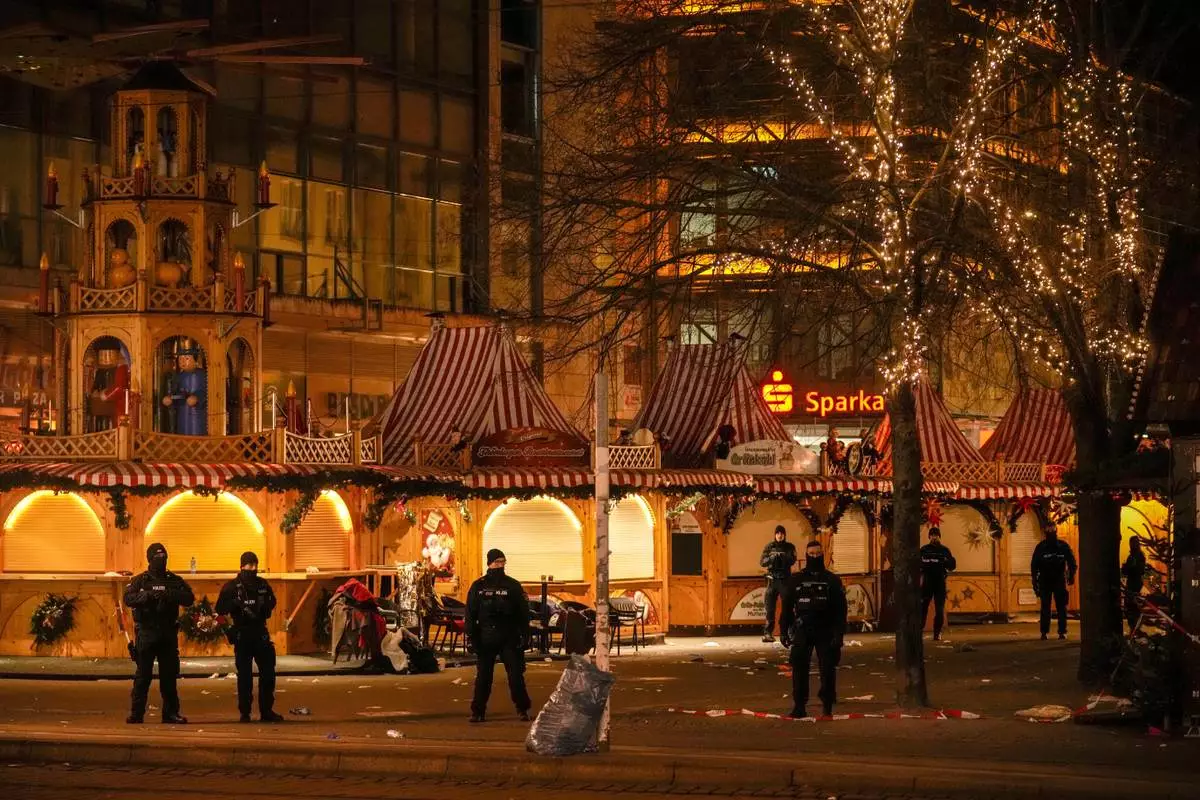
Security guards stand in front of a cordoned-off Christmas Market after a car crashed into a crowd of people, in Magdeburg, Germany, Saturday early morning, Dec. 21, 2024. (AP Photo/Ebrahim Noroozi)
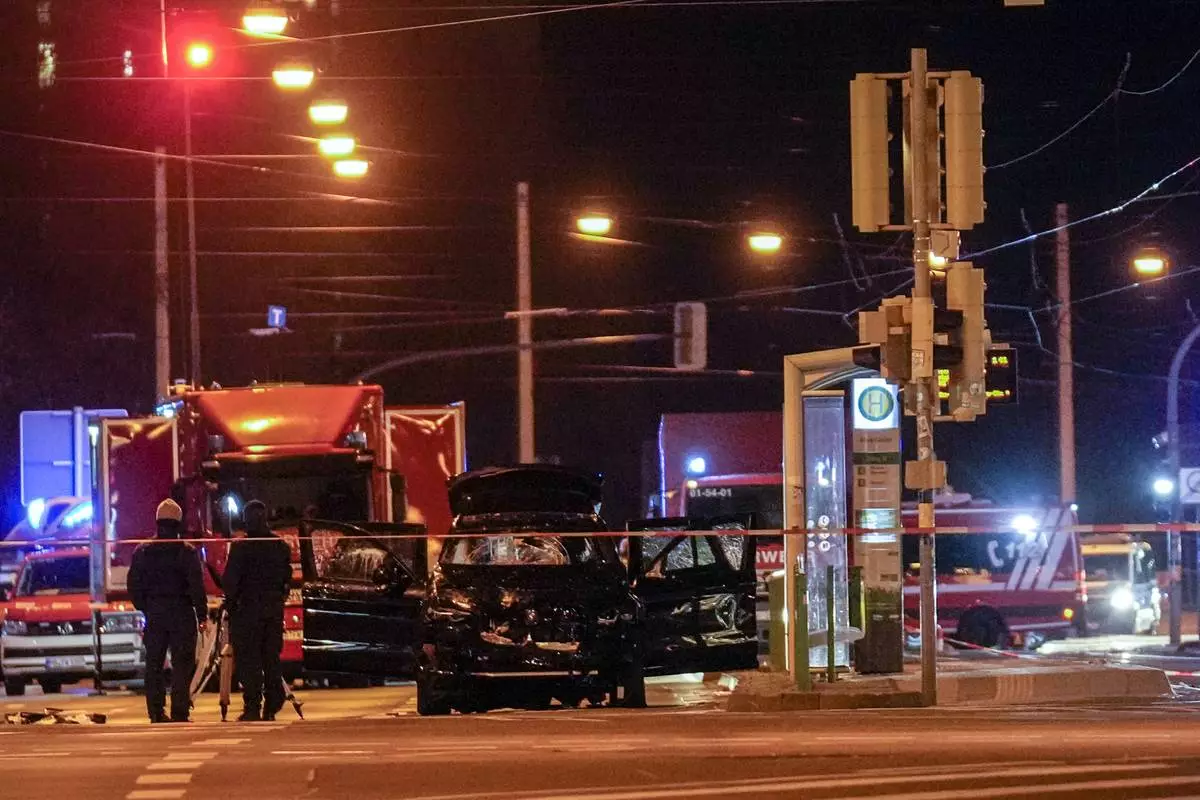
The car that was crashed into a crowd of people at the Magdeburg Christmas market is seen following the attack in Magdeburg, Germany, Saturday early morning, Dec. 21, 2024. (AP Photo/Ebrahim Noroozi)
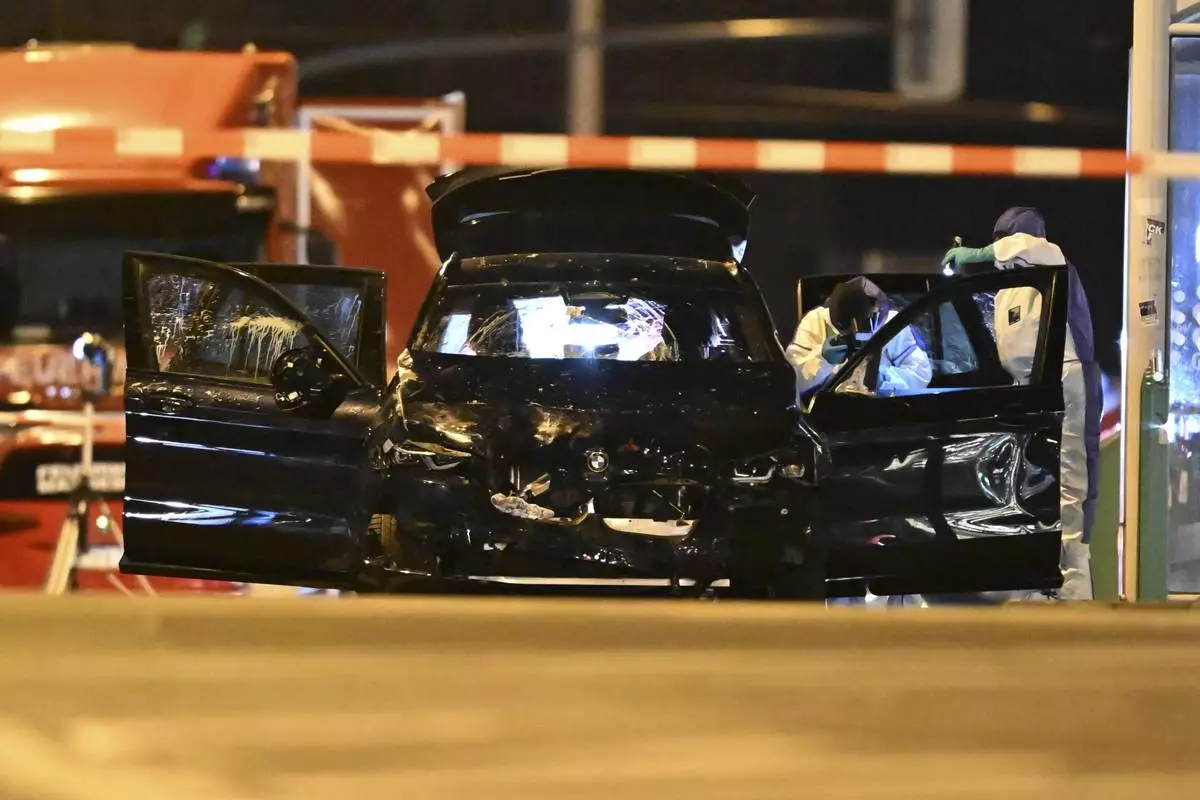
Forensics work on a damaged car sitting with its doors open after a driver plowed into a busy Christmas market in Magdeburg, Germany, early Saturday, Dec. 21, 2024. (Hendrik Schmidt/dpa via AP)









